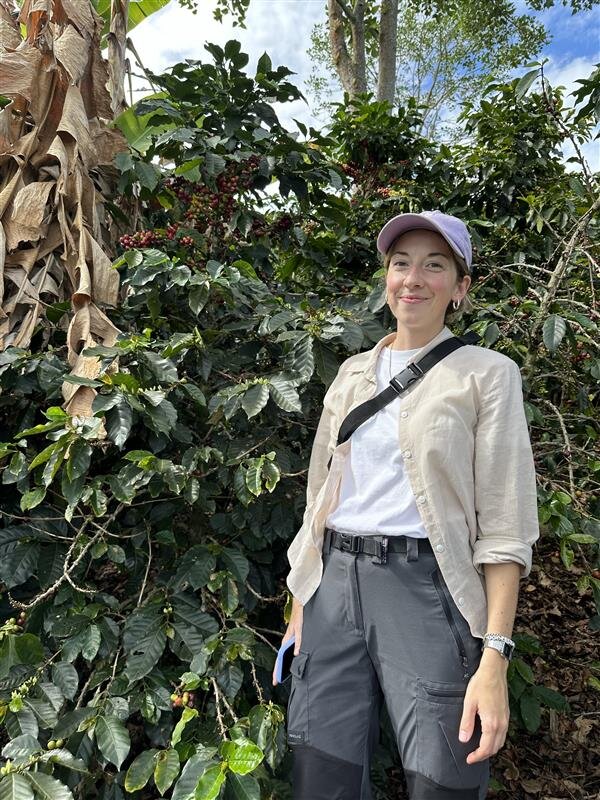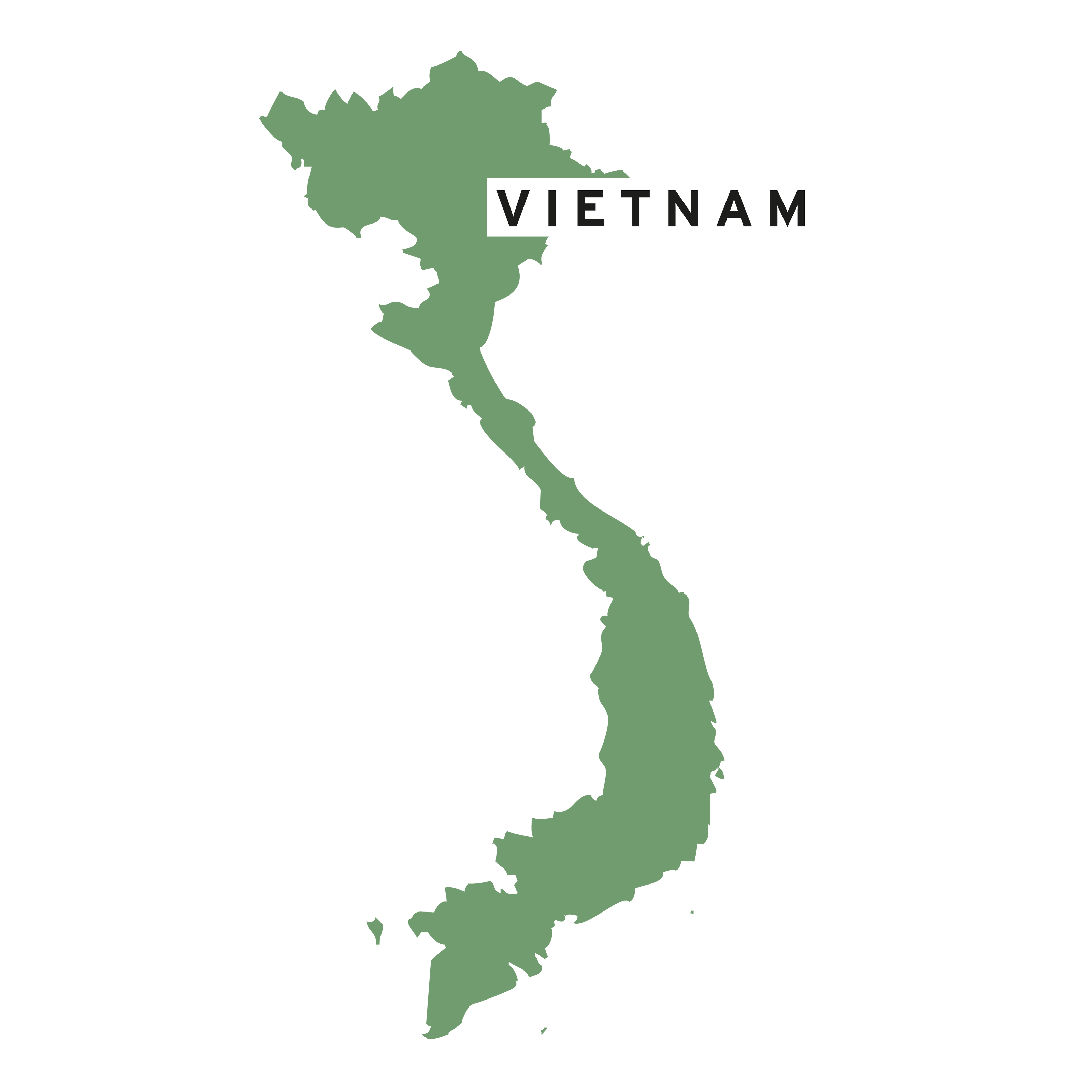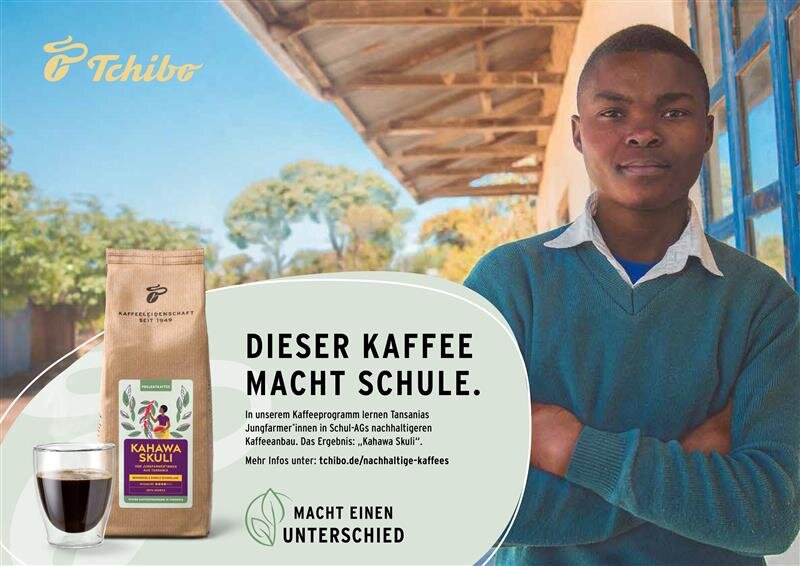Coffee
Country Programs
Based on the regional Enveritas analyses and the identified problems, we develop tailor-made, multi-year programs together with the people in our supply chains to solve the problems collectively. We focus on the most pressing issues. It is important to us to involve the farmers from the beginning in the program development and to work together with local partners on the implementation of the programs. In doing so, we build on existing structures and use the experience and knowledge of the people on the ground. During the course of the project, Enveritas then checks whether the programs are taking place as planned and their impact is as expected.
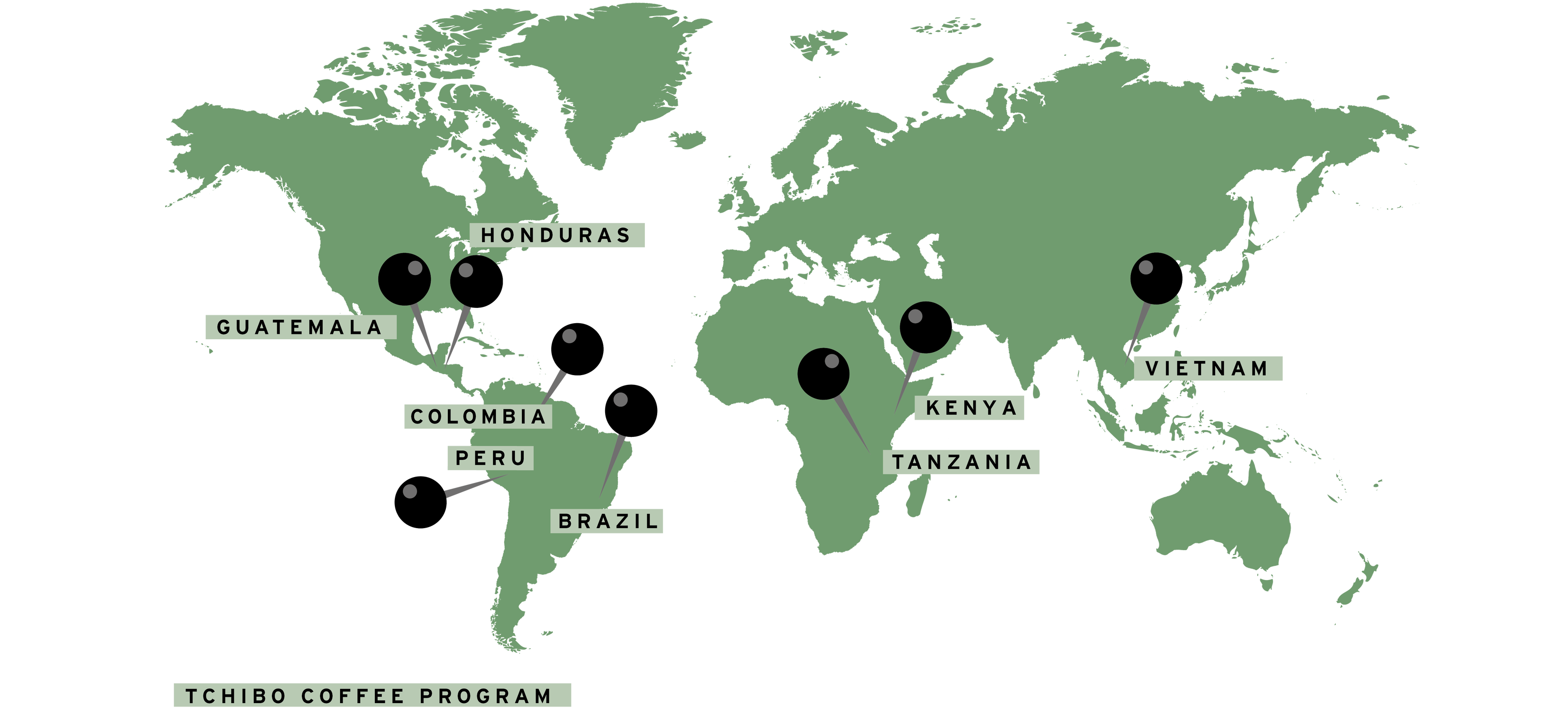
Currently, we are active with our coffee program in Brazil, Colombia, Guatemala, Honduras, Kenya, Tanzania, and Vietnam.
Other countries will follow.
Our existing Tchibo Joint Forces!® projects continue and are gradually being integrated into the new coffee program.
Our programs in detail
Stand: September 2025
Brazil
Project: Sul de Minas | 2025-2028
Project objectives: Adaptation to climate change, responsible use of agrochemicals (sustainable weed, pest, and disease control), reforestation of native vegetation
Identified challenges: Impacts of climate change
Reforestation of permanently protected areas: In Brazil, the protection of water and land areas is regulated by law in the so-called "Código Florestal" (Forest Code). Every landowner is therefore obliged to protect or replant a minimum amount of land. Together with local partner organisations and the Tchibo representative Cassio Franco Moreira, we are setting up learning communities with the aim of supporting farmers in improving environmental protection. We organise workshops with farmers where they receive information and learn the theoretical basics. We also go to the farms to put what we have learnt directly into practice: How are these areas measured, prepared and reforested with plants that correspond to the original vegetation? Together with trainers and equipped with the appropriate seedlings, the young trees are planted - the first steps towards protecting and developing the natural water body and the basis for more biodiversity.
climate adaptation and resilience: The project supports farmers and trainers by providing information and sharing knowledge on how to adapt to harsh climate conditions. Several workshop sessions have been organised to present the risks and possible technical solutions to mitigate these risks. Topics such as ground cover, the use of shade trees, the use of windbreaks and the protection of water bodies were covered. Pilot projects on the use of shade trees and the mixed cultivation of coffee with fruit trees such as bananas and avocados are also being carried out with several farmers.
Sustainable weed, pest and disease control: Together with farmers, trade, research and advisory partners, we have developed and researched practices to reduce dependence on synthetic pesticides and herbicides. The focus is always on identifying technically efficient solutions that are also economically viable on a large scale. The project has promoted pilot projects and workshops on sustainable weed management and tested alternative methods of weed control, such as mechanical control, reduced use of herbicides and the use of catch crops. We have analysed the impact of these practices on soil health and profitability. We have also funded pilot projects on sustainable pest and disease management, where organic products, preventive measures and other more sustainable practices are tested and validated by researchers and farmers. Farmers, agricultural students and trainers have been trained and the methods and results are shared through field days and practical workshops. Publications are also being developed.
Together for a better coffee economy: In the Paisagens Sustentáveis project, we work with different partner profiles, including two cooperatives, Coomap and Coopfam, and two exporters, Exportadora Guaxupé and Olam Food Ingredients (OFI). This constellation enables farmers to learn from and with each other, to scale the approaches and to create dynamics that motivate everyone in favour of sustainability.
> Instituto BioSistêmico (IBS)
> Coomap
> Coopfam
> Exportadora Guaxupé
> Olam Food Ingredients (OFI)
> Rabo Foundation
> Emater
> Universidade Federal de Lavras – UFLA
> Instituto Federal do Sul de Minas (IFSMG)
Farms reached: 1,200 (December 2024)
By December 2024, around 1,200 smallholder farmers had been trained by highly qualified trainers and networked with each other through the learning communities. The project has also reached and trained more than 150 trainers and agricultural students. These serve as an environment in which everyone can benefit from the experience of others. The farmers also support each other if, for example, a helping hand is needed or a piece of technical equipment is required.
In the 2023/2024 cycle, the project integrated Emater, a Brazilian rural development agency that supports the project in training farmers and developing field pilots for sustainable weed management and the use of catch crops. UFLA has also joined the project to plan and analyse the results of the field pilots and support the development of farmers and scientific publications. IFSMG also joined the project in 2024 and has developed the technical content, workshops and field pilots for sustainable pest and disease management. Collaboration within the team works very well. Together with the partners involved, we define all the important issues - for example, which goals we set ourselves, which workshops are necessary, where new seedlings are planted or which pilots (= demonstration projects) are started. It is also important to us to involve our local suppliers in decision-making processes. Transparent communication between all project partners takes centre stage. Depending on the development of the results, we regularly evaluate and work on the constructive further development of the measures. Our goal is to reach a total of 5,000 farmers by 2028.
As the number of farmers grows, it will be necessary to reach more farmers with the participating partners and also involve more partners such as exporters, cooperatives and associations in the project.
Murillo is an agronomist at Enveritas. And as an agronomist, Murillo knows how important and helpful it is to honestly analyse local conditions. This is the only way to really identify and tackle the problems and causes.
"We want farmers to receive the help that really helps."
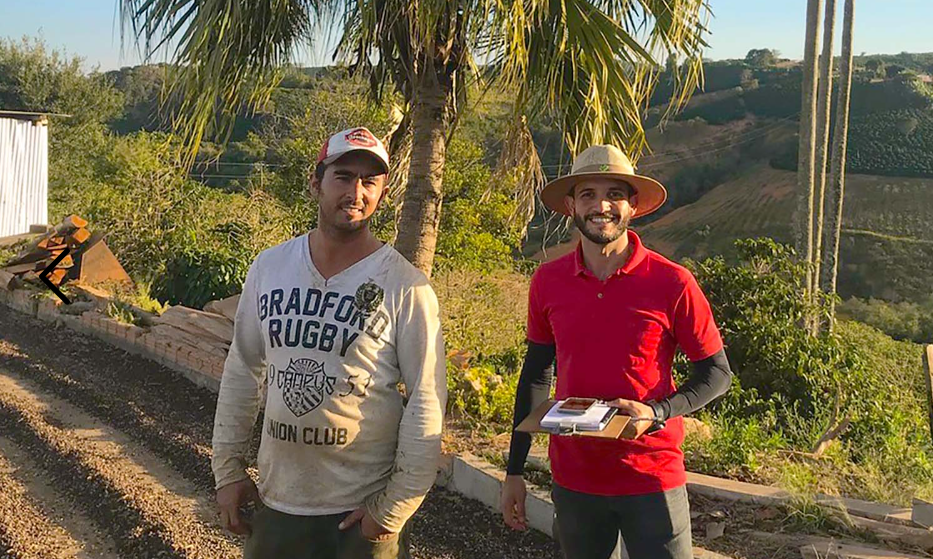
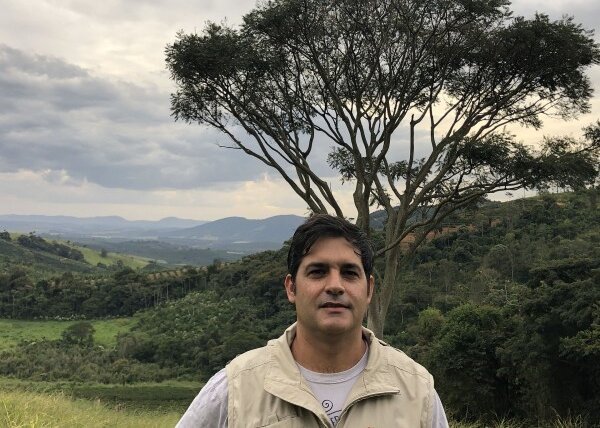
Cassio is Tchibo representative, coffee farmer and owner of a certified organic farm in the highlands of Sul de Minas. He explains:
"I have the impression that the Paisagens Sustentaveis project is on the right track and has shown that change can be brought about in the Sul de Minas region, the world's most important region for the cultivation of Arabica coffee. We are very pleased that the partners and especially the small and family farms are very committed and satisfied. This will enable us to attract more farmers to join the project and bring about real change. This is not only good for the farmers, exporters and cooperatives, Tchibo and other roasting companies - but for the entire planet."
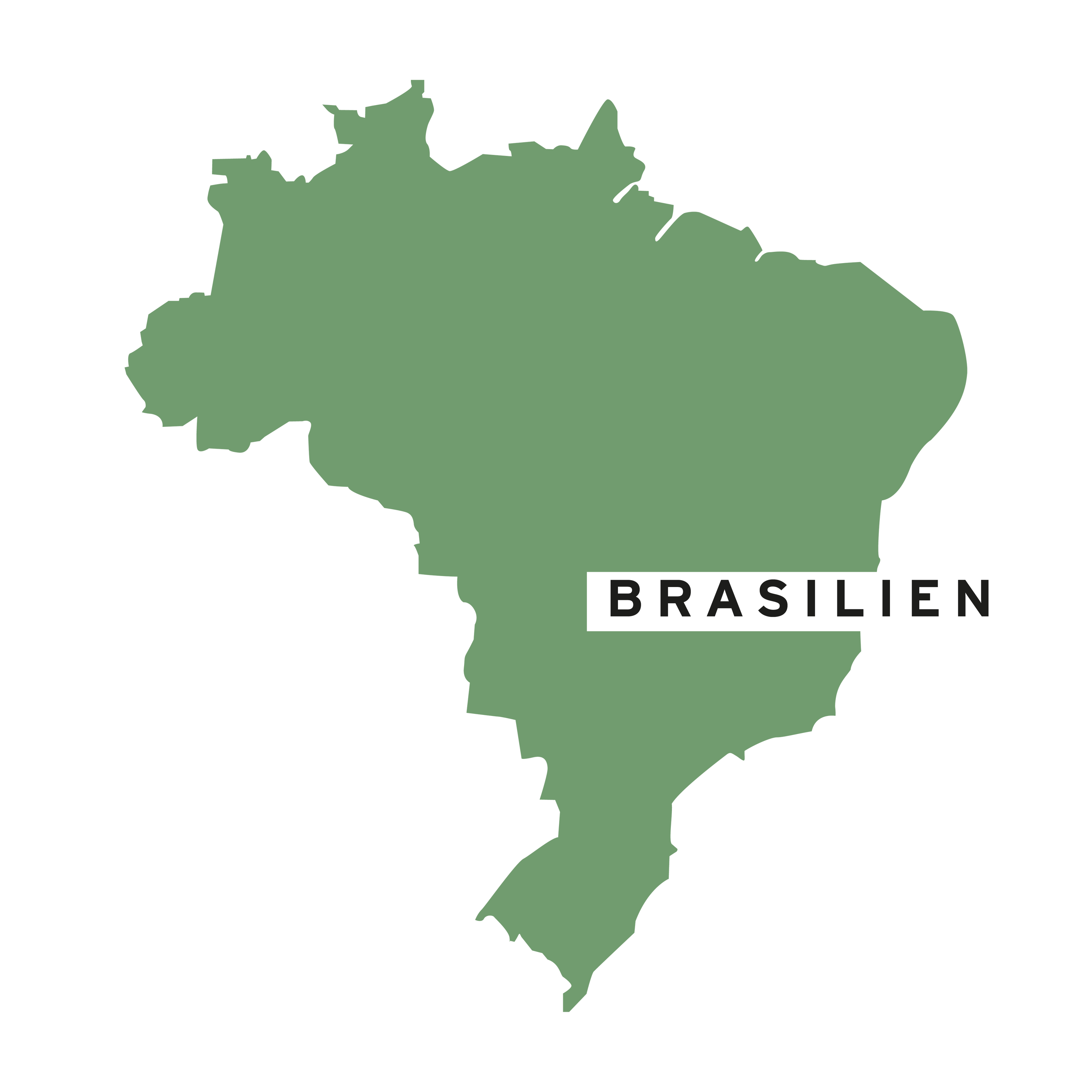
Guatemala
Project: Santa Barbara | 2024-2029
Project goals: Adaptation to climate change, increase in income, reduction of child labour
Identified challenges: Poverty, emigration, child labour, climate change
Increasing income: More knowledge leads to more income - for this reason, Coffee Care and Tchibo in Guatemala offer various workshops on topics such as Good Agriculture Practices (GAP), knowledge of fertilisers and soil treatment, which contribute to increasing the productivity and quality of coffee and are intended to help with adaptation to climate change. This can help to improve the income and living conditions of local people. We also support farming families in generating additional sources of income beyond coffee. These include, for example, alternative agricultural projects (based on the Land For Life Project, Honduras - Inga Foundation) or the use of an adapted type of hydroponics. Here, food is grown for personal use or for resale. This type of cultivation requires considerably less water than conventional agriculture. The required nutrients are supplied to the peat moss via the water.
Farmer workshops on coffee cultivation: After several years in the region, we have recognised that the farmers have different levels of knowledge. For this reason, we have divided them into different groups in order to best meet their challenges and provide customised support. The new farmers in our programme receive basic workshops in which they learn everything about coffee cultivation, while those who we have been supporting with workshops for some time receive know-how in dealing with fruit trees and/or ginger trees. Ginger trees are tropical trees valued for their edible, sweet and vanilla-like fruits as well as their ability to improve the soil through nitrogen fixation
Tchibo Coffee Clubs: After several years of working with children and young people in Santa Barbara, it was obvious that modern topics such as social media, technology and the online world in general have become the main interest of young people. When asked about their future, only a few mentioned farming. Emigration to Mexico and/or the USA is an option for many. If this were to happen, the coffee supply in the region would be jeopardised and it is not certain that these young people would experience an improvement in their living conditions. Coffee cultivation continues to play an important role in Guatemala and is a driver for the economy, which is why we want to start here and offer the young people a perspective to stay in their home country and at the same time play an important role in the further development of their country. We train young people at so-called Coffee Clubs. The topics we teach them in the schools range from an introduction to coffee cultivation, knowledge of coffee seedlings, organic fertilisers, knowledge of wet processing and soil health through to marketing their own coffee.
Strengthening the development potential of girls and boys: Abriendo Oportunidades is a Population Council programme aimed at giving Guatemalan girls between the ages of 8 and 17 access to education, healthcare and other further training opportunities. After several years of implementing this project with only girls, we decided together with our partner Coffee Care that we would also like to support boys in order to create mutual understanding and positive change in the long term. Over the next five years, we will therefore provide boys and girls with customised support that meets their needs. The programme will include workshops and education on topics such as leadership skills, health and hygiene, violence prevention and economic empowerment. The programme also aims to build self-confidence and create a deep understanding for both sides to make long-term decisions for themselves and the community and bring about change in their lives.
Coffee Care
In the current project, we are supporting 3,400 farmers and their families in various ways. Before the project began, there was not much demand for coffee from Santa Barbara. This has changed since our involvement on the ground: Interest in sourcing coffee from this region has increased. This has also boosted the economy and prices are rising with every harvest. All this has led to the farmers producing more coffee on their plots and being able to sell it at a higher price than before. The workshops have achieved good learning outcomes - the farmers have deepened and improved their knowledge of fertilisers, plantation management, coffee harvesting and processing. This has enabled them to sell high-quality coffee. The environment has also benefited, as the area is now cleaner and wastewater is controlled. The harvest from our peat moss farming project has been very good in the past and has therefore been expanded. In this way, we will continue to contribute to improving the local food situation. Coffee Care has been active in the community for a long time. Against this background, the local people know Coffee Care and the employees, so that there is a relationship of trust and there are also fewer teething problems when expanding our joint activities.
The focus of future projects should not only have a high impact, but also a direct link to Tchibo's business activities. A basic prerequisite for the realisation of projects is that we involve local people in the decision-making process. The fulfilment of their needs must be reflected in the projects in order to make positive changes possible in the long term and achieve success. It is important to provide people with expertise so that they can make their own decisions based on this. We want to buy coffee from the farmers we support through our project work so that they have a buyer and we can pass on high-quality coffee to our customers. It is important to take local structures into account. This is the only way to really change the situation on the ground with our projects. This also applies to family structures. These are different in Guatemala than we know them in Europe. Working with girls and boys could also change things here in the long term. We have developed the new concept together with our partner and their employees. We see even greater self-motivation and willingness to drive the programme forward.
Armanda Gomez, coffee farmer in Guatemala:
"Now I get more money for my coffee."
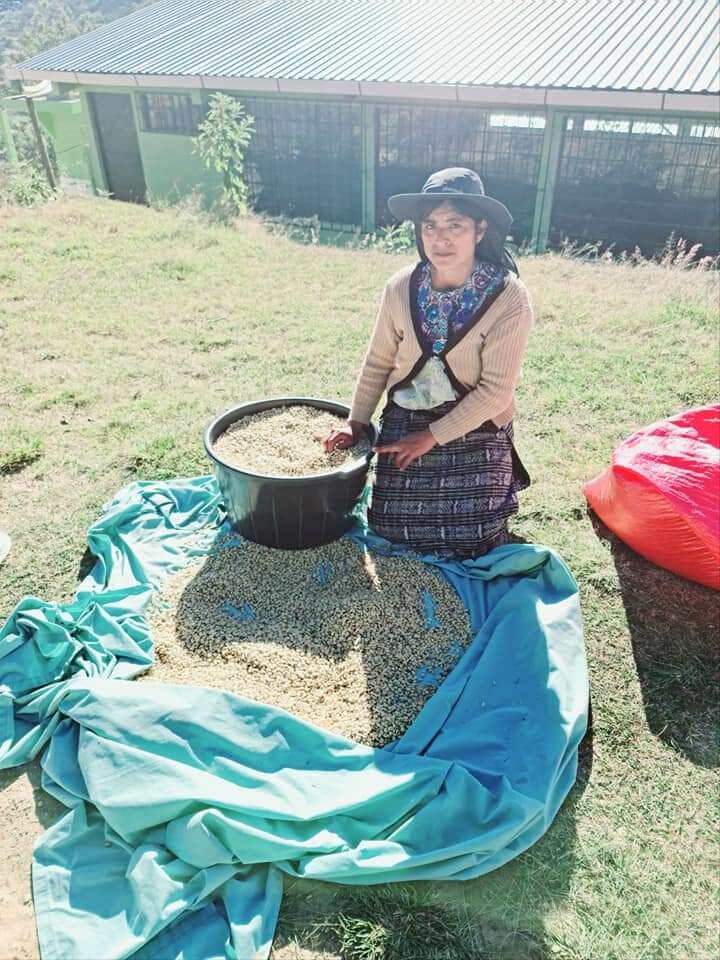
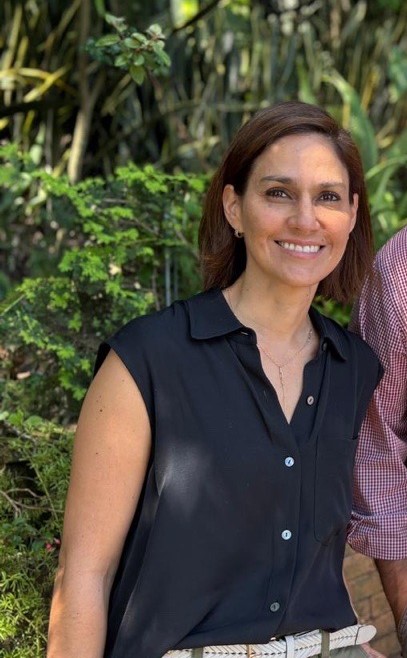
Crista Foncea, serves - in addition to her role as Director of Coffee Care - as Tchibo's representative in Guatemala, Peru, and Honduras, coordinating regional sustainability programs as the central liaison between coffee farmers, partners, and Hamburg headquarters.. She explains:
„For almost two decades, I've had the privilege of witnessing firsthand the passion and hard work that go into every cup of good coffee. It’s incredibly rewarding to be part of a company that not only values this but also deeply cares for the people behind it. Our work in coffee-growing regions is more than just business—it's about building genuine relationships, embracing diverse cultures, and pursuing a shared vision of fairness and equality. I’m truly grateful to be on a team committed to making a tangible, positive impact on the lives of coffee producers, their families, and the environment.“
Aida, Program Manager for Guatemala in the Tchibo Corporate Responsibility Team:
"I really enjoy working with the team in Guatemala because we are creating a change in living conditions together with the local people. And one that meets the needs of the farmers and their families. Every element of the project was discussed and scrutinised. Through diversification, for example, we are not only supporting coffee cultivation per se, but also the environment and the people themselves. The people grow fruit trees to feed themselves, which provide the important shade for the coffee plants to thrive properly. The soil and wildlife also benefit from the different plants."
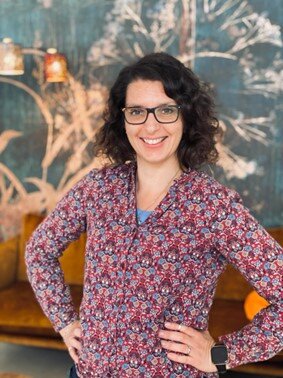
In September 2025, we launched a special Privat Kaffee Limited Edition: our project coffee from Guatemala, a coffee from the project region of our Tchibo coffee program. Private Coffee Limited Guatemala combines the highest level of enjoyment and sustainability: The project coffee comes from Santa Bárbara, where we promote more sustainable coffee cultivation through our Tchibo coffee program by planting shade trees. How? By financing shade trees that are planted between the coffee plants. A benefit for coffee quality and the climate – because the trees fix nitrogen, provide shade, and their leaves and branches supply the soil with nutrients.
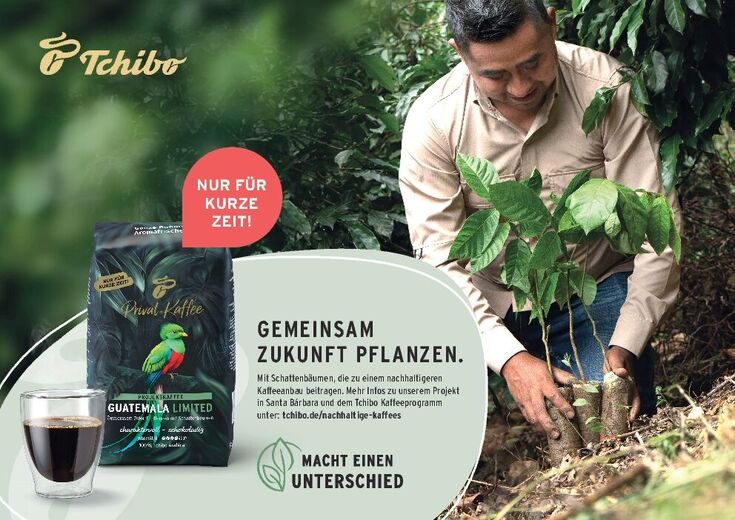
They're good for the climate: Inga trees extract nitrogen from the air and enrich the soil. Their dense root system protects the soil from erosion. At the same time, they promote biodiversity and create habitats for numerous animal and plant species.
They're good for coffee: The shade trees protect the hypersensitive coffee bushes from excessive sun. Leaves and branches that fall to the ground provide the soil with additional nutrients – which the coffee appreciates.
They're good for farmers: Some Inga species bear edible fruits that farmers can harvest – as nutrient-rich food or as an additional source of income.
The farmers receive the necessary knowledge in accompanying training courses.
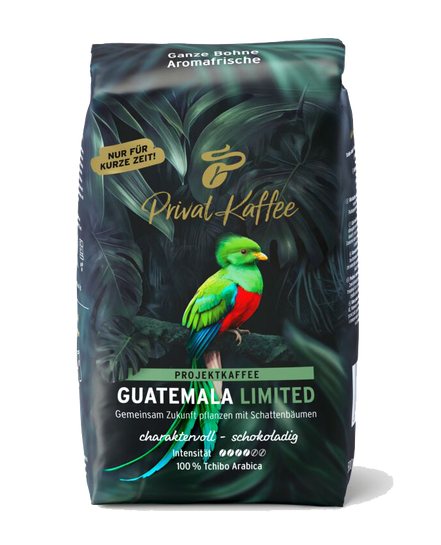
About the product:
- Aromatic with notes of dark chocolate and slightly sweet fruity apricot – the typical Guatemalan coffee flavor.
- Recipe: 100% Arabica, Single-Origin Guatemala
- Flavor Profile: Full of character, chocolatey
- Intensity: 4/6
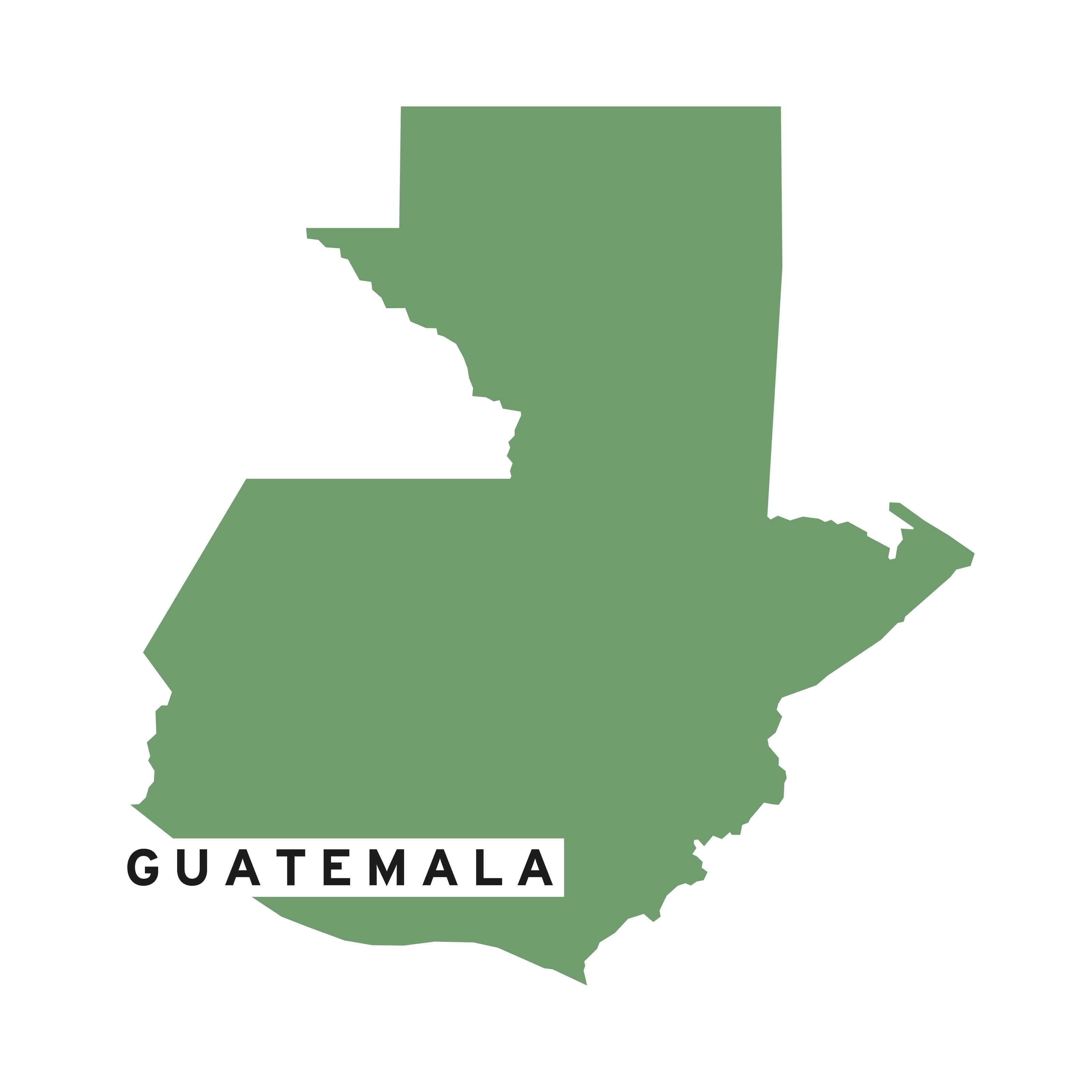
Honduras
Project: San Andrés und Caona | 2022-2027
Project objectives: Income generation and adaptation to climate change, childcare
Identified challenges: Poverty, migration, soil health, child labour
Holiday care during the harvest season: In Honduras, the coffee cherry harvest season usually begins in October and lasts until February. This period also includes the school holidays - the result: due to a lack of childcare facilities, many coffee farmers have to take their children to the coffee plantations at this time, where they often play unsupervised in the fields or help harvest the coffee cherries. Tchibo is therefore creating childcare options in partnership with Becamo. In daycare centres, the children are looked after by qualified staff during the day, and they also receive meals and have access to educational opportunities. As the holidays fall at the same time as the harvest season, teachers are employed in the daycare centres - ideally for the entire duration of the project. This allows us to secure routines and save time for organisation and workshops. Farmer families are sensitised to the problems of child labour in special training sessions - conversely, this is also one of the reasons why the daycare centres are well received.
Increasing income through diversification in cultivation: Diversification is an important approach to increasing the productivity of the farms - both ecologically and economically. To this end, Tchibo and Becamo support the cultivation of fruit trees, including avocados and citrus fruits, on the coffee fields. This brings various benefits: The fruit trees provide necessary shade for the coffee plants, which can increase quality and performance. At the same time, the fruit trees provide food for the farmers and their families. Under certain circumstances, they can even become a second source of income. The cultivation of different varieties and the production of bio-input also ensure better biodiversity and soil health, thereby contributing to the fight against climate change.
Production of bio-input: Tchibo is committed to building 200 pulp handling boats by 2027. These are machines in which bio-input is generated by drying coffee pulp - natural fertiliser that can be used in the fields and also sold. This in turn leads to the development of another source of income.
New paths, new partners: In Honduras, Tchibo began working with the Inga Foundation in 2022, which launched the "Land for Life" project in 2012. The aim is to help smallholder farmers to lift themselves out of poverty. To this end, the foundation supports smallholders in the first step with basic foodstuffs, in the second step with firewood, which is used for heating and cooking in rural areas of Honduras, and in the third step with cash crops - plants with which farmers can earn money. In addition to pepper and cocoa, this also includes coffee. In addition to supporting local families and helping them to help themselves, these measures have led to an improvement in soil quality, which in turn reduces the need for slash-and-burn farming. This is because nutrients are added to the soil not through slash-and-burn, but through the cultivation of the various plant species, and the soil is also supplied with additives such as potassium or phosphorus at regular intervals. As a result, very good, fertile soil is cultivated in the regions, which no longer requires chemical additives.
Management skills: Learning together and from each other - Tchibo helps to increase the income of local farmers with exercises to strengthen management skills as well as productivity and quality workshops. The workshops are designed in such a way that interested parties such as neighbours or relatives can join in and learn at any time - because Tchibo and Becamo are pursuing the goal of making coffee knowledge accessible to everyone at a low threshold and thus improving the coffee economy in Honduras across the board.
Learning programmes for young people: Emigration is a major challenge for the future viability of Honduras. Young people in particular are leaving the country because they see no prospects there. One approach to counteract this is to promote the socio-economic profitability of coffee cultivation. IHCAFE is pursuing precisely this goal. Tchibo is utilising synergies with this Honduran institution to secure coffee cultivation in Honduras. Inspired by IHCAFE's existing learning content, we have developed our own programme for young university graduates. In a management skills workshop programme, the prospective farmers learn about the business of coffee farms and how they can manage them.
Contractually regulated purchase quantities: By working with Tchibo, coffee farmers can be sure that they will sell the coffee they grow. This is because the coffee purchase quantities are contractually regulated. This gives the people in Honduras more predictability and security.
Becamo, Inga Foundation
In total, 1,612 farmers will benefit from the project by the end of July 2027. Becamo itself is supporting a further 3,000 farmers. The workshops and measures are proving successful - so far, the productivity of the participating farmers has increased by 10 to 15 per cent. Each year, Tchibo expects an average of 206 children to be taken in and cared for in the daycare centres during the harvest. In the first harvest season, 174 children were looked after. We are also particularly pleased that the daycare centres have met with great general interest and are a source of inspiration for further projects: For example, a neighbouring cooperative has taken up the idea of the daycare centres and would like to set up its own childcare facility with our support. The partnership-based cooperation with Becamo has always taken place on an equal footing and has made it possible not only to promote exchange, but also to build bridges to other Tchibo projects and initiate dialogue across national borders. A first step was to link Honduras, Guatemala and Tanzania on the subject of young people and coffee cultivation. The collaboration with the Inga Foundation also makes it possible to share skills, gain experience and, above all, learn from and with each other.
What we learn from this programme: diversification is a profitable measure - both for the farmers and for the environment. Tchibo therefore wants to work in coffee-like supply chains and promote the cultivation of different types of fruit. Utilise the farmers' expertise and integrate it into processes - because then mutual learning becomes possible, from which Tchibo as a company can also benefit. Involve more women and young people in workshop programmes. This is why, for example, workshops are organised in the afternoons so that as many interested people as possible can take part. The longer the partnership lasts, the easier it is to work together. A good basis of trust plays an important role in effective cooperation. Getting together with partners who share a similar mindset and act as equals. In Becamo, Tchibo has a project partner that is very open to new ideas and approaches and thus continues to successfully pursue the common path. Thinking across national borders and utilising synergies. For the future, an exchange between different project managers from different countries is planned in order to learn from each other and ensure that mistakes are not made twice.
Jose Valerio Diaz, Kaffeebauer:
"Thanks to the technical support I received, I was able to improve the conditions on my farm and increase productivity per area. In addition, thanks to the training, I have been able to reduce the incidence of pests and diseases because I have learned to develop and use organic products that are available to me on my farm."
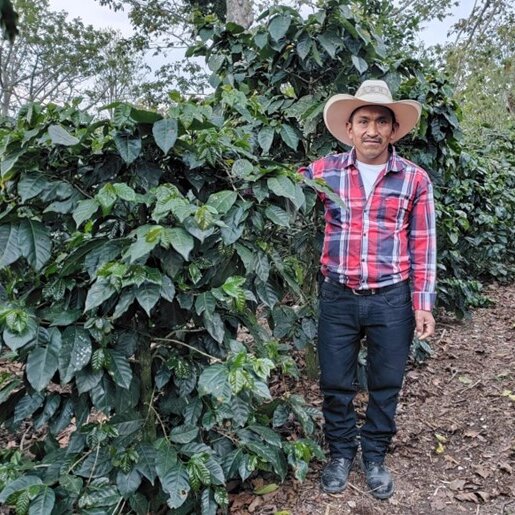
Aida, Country Program Manager for Honduras in the Tchibo Corporate Responsibility team:
"Honduras is a beautiful country with major challenges. Together with farmers, we are changing their current situation. I am delighted to have such open and goal-oriented partners like Becamo and the Inga Foundation at our side to create long-term and sustainable change."

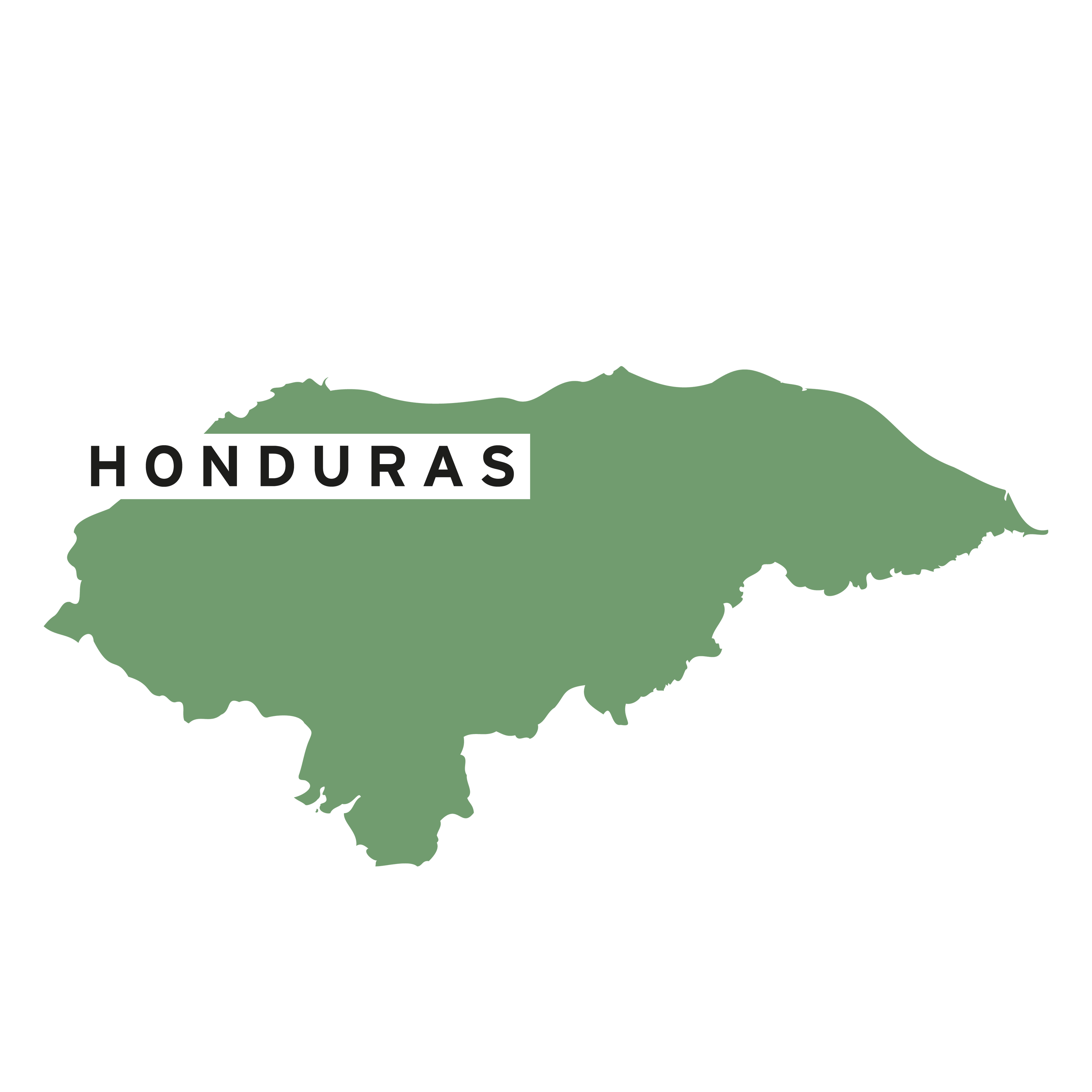
Project: Lempira, Copán, Ocotepeque | 2024-2029
Project objectives: Adaptation to climate change, income increase.
Identified challenges: Poverty, emigration, soil health, child labor.
Increasing income through diversification in cultivation: An important approach to increasing the productivity of the farms - both ecologically and economically - is diversification. To this end, Tchibo and Fundación Cohonducafé support the cultivation of fruit and timber trees in the coffee fields. In addition, vegetables are grown and chickens and bees may be kept. These measures bring various benefits: The fruit and timber trees provide necessary shade for the coffee plants, which can increase quality and performance. At the same time, the fruit trees and vegetables provide food for the farmers and their families. Under certain circumstances, they can even become a second source of income. Just like the sale of eggs, chickens or honey. The cultivation of different varieties and the extraction of organic input also ensure better biodiversity and soil health and thus contribute to the fight against climate change.
Farmer workshops on coffee cultivation: More knowledge leads to more income - for this reason, Fundación Cohonducafé and Tchibo in Honduras offer various workshops on topics such as Good Agriculture Practices (GAP), knowledge about regenerative agriculture and soil treatment, which contribute to increasing the productivity and quality of coffee and are intended to help with adaptation to climate change. This can help to improve the income and living conditions of local people. In addition, farmers receive more climate-resistant coffee plants and learn how to deal with the by-products of coffee cultivation (pulp and wastewater) in order to use them profitably (e.g. production of natural fertilizer).
Awareness raising and gender equity: As part of our joint program, experts in human and labor rights, child labor prevention, gender equity and social inclusion will work with the farming families and the trainers to raise awareness, sensitize and educate them on gender equity, sharing of activities in the field and at home, shared responsibility, coexistence, leadership, women's empowerment and appropriate workplace conditions. We are planning a variety of models for the transmission of this knowledge: forums, podcasts, videos and audio programs in "soap opera" format. To encourage greater participation of women in coffee issues and strengthen their involvement in their families and communities, it is planned to create a women's network to share experiences, information and educational material and to create closer links between them.
Contractually regulated purchase quantities: By working with Tchibo, coffee farmers can be sure that they will sell the coffee they grow. This is because the coffee purchase quantities are contractually regulated. This gives the people in Honduras more predictability and security.
Fundación Cohonducafé
We plan to support 900 farmers and their families. At least 675 coffee farms will be using agroforestry systems by the end of the project in 2030. 25% of the people receiving support are women.
Aida, Country Program Manager for Honduras in the Tchibo Corporate Responsibility team:
"Honduras is an important coffee sourcing country for Tchibo and thus we are excited to expand our coffee program with another fantastic partner. Collaborating with Honducafé and their incredibly dedicated and knowledgeable team is a true pleasure. Together, we are focused amongst other areas on empowering women to find their roles and flourish in the Honduran coffee sector — a crucial endeavor given that migration is a major challenge."

Kenya
Project: Kirinyaga, Mount Kenya | 2025-2028
Project objectives: Adaptation to climate change through the promotion of regenerative farming practices, increased productivity and quality, income diversification, and gender and youth inclusion.
Identified challenges: Climate change, soil erosion and biodiversity loss, and income.
As part of our project, with the support of the Coffee Research Institute (CRI), we are training 100 lead farmers on sustainable coffee cultivation, soil conservation, and regenerative agriculture. The lead farmers will share their acquired knowledge with their neighbors and peers, with additional support from agronomists who accompany the project. Cooperative employees will also receive training in coffee processing and quality assurance, as well as in the establishment and maintenance of nurseries for coffee seedlings and shade or fruit trees. Our project also includes the establishment and improvement of demonstration farms, some of which already exist on the cooperative's premises. We aim to implement regenerative farming practices to demonstrate their impact and increase productivity so that the cooperative can generate additional income, which can be used for important infrastructure improvements, among other things.
We will also support farmers in developing income diversification strategies and in accessing financing and credit.
Rainforest Alliance, Ibero (NKG) Kenya, Inoi Farmers Cooperative Society Limited
At our official project launch in June, nearly 1,000 coffee farmers, youth and women's groups, and key stakeholders from the coffee sector came together. Together with our project partners, we were able to present our "Brewing the Future – Coffee 2 Stay" program, spark interest among farmers, and lay the foundation for future activities.
William from Ibero Kenya (NKG):
"NKG's collaboration with the Inoi Cooperative and the other partners represent a renewed interest in coffee farming among coffee farming communities in Kenya. This collaboration will result in increased coffee productivity in sustainable manner. Thus, resulting in improved livelihood, environmental protection."
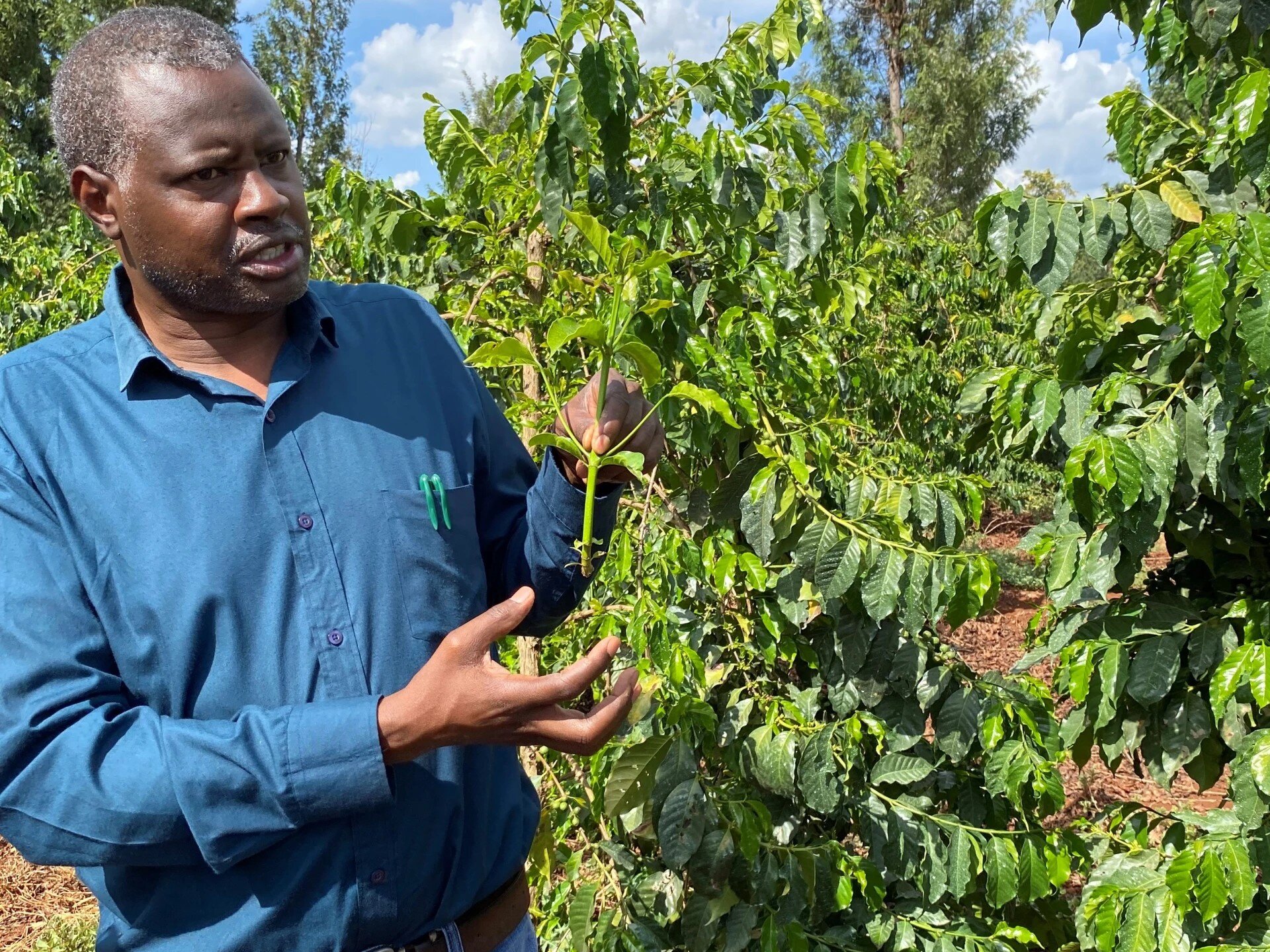
Lena, Program Manager for Kenya in the Tchibo Corporate Responsibility Team:
"Our Tchibo sustainability activities in Kenya already have a long history. Tchibo has long been involved in the Mount Kenya region and is committed to improving the living conditions of local coffee farmers. The first major Mount Kenya project began in 2010, and we are delighted to be returning to this region with new partners as part of our Tchibo Coffee Program."
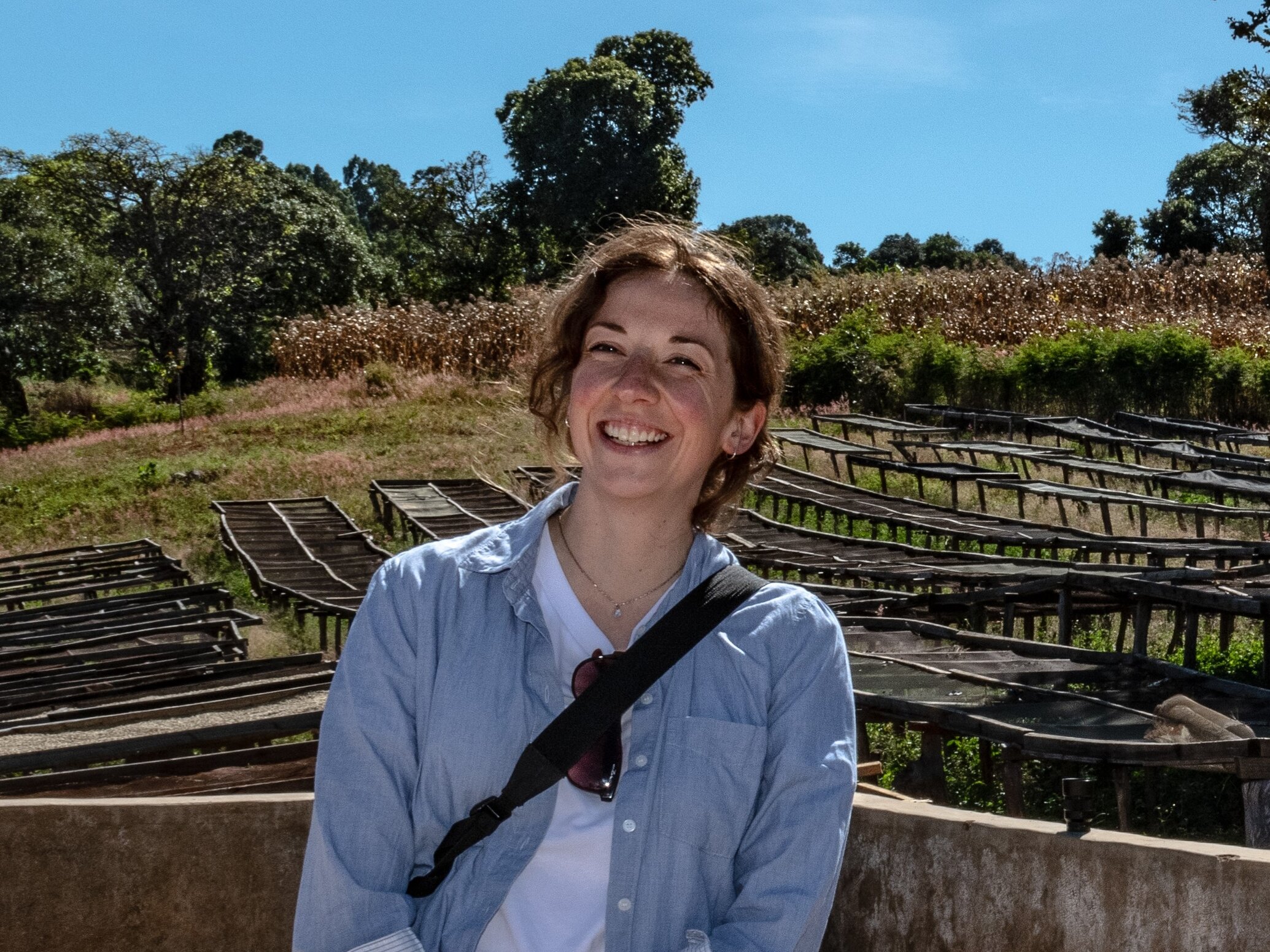
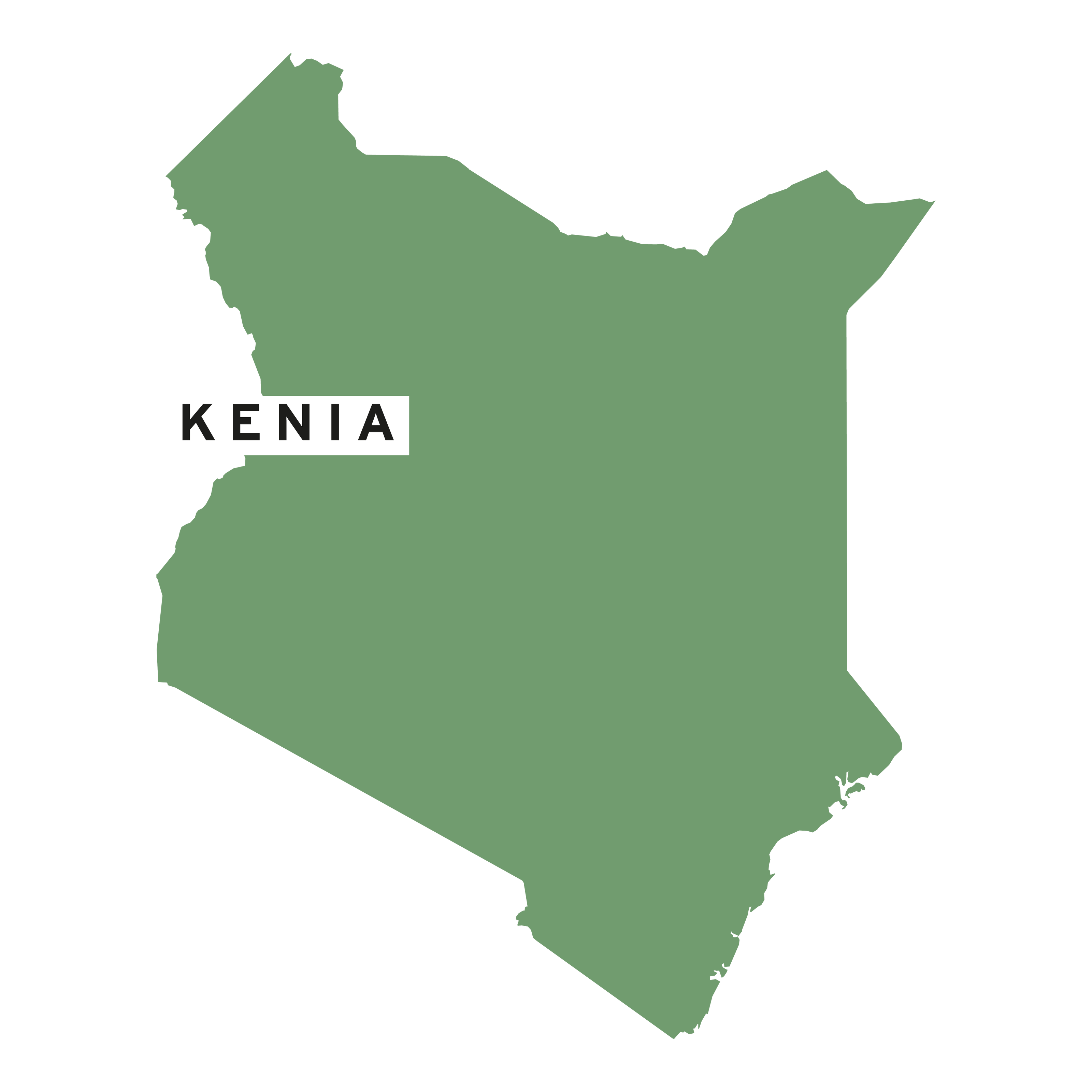
Colombia
Project: Antioquia, Huila, Tolima & Valle de Cauca | 2024-2025
Unfortunately, we had to bring our project in Colombia to an early end. It was originally planned to run for three years, from 2024 to 2027. We are currently reviewing how we can continue our sustainability commitment in Colombia in future.
Project objectives: Reducing water consumption and pollution, improving soil health and productivity, adapting to climate change
Identified challenges: Climate change, high water consumption and pollution during coffee processing, lack of measures to maintain soil health
Together with our partner Expocafé and the cooperatives Cocafisa, Cafisur, Coocentral and Cafenorte in Antioquia, Tolima, Huila and Valle de Cauca, we worked on a project to increase the productivity and quality of coffee and thus also the income of coffee farmers, and to make cultivation practices and coffee processing more environmentally friendly, which means, among other things, reducing water consumption and water pollution. Our measures were as follows:
In special workshops, farmers were taught sustainable farming practices with the aim of making cultivation and processing more environmentally friendly, promoting biodiversity, increasing the health and resilience of coffee farms, and ensuring high levels of productivity and quality. This included, for example, a workshop on integrated pest management using a combination of biological, chemical and mechanical means. The safe handling of agricultural chemicals was also part of the workshop. In addition, the aim was to strengthen the exchange between farmers.
Selected farmers were also provided with environmentally friendly technologies such as wet coffee processing tanks and green filters, which minimise negative impacts on the environment. Agronomists supported the farmers in the correct use and maintenance of these technologies, as well as in other questions related to the cultivation and processing of coffee.
Cocafisa, Expocafé, Cafisur, Coocentral, Cafenorte
Since August 2024, our project has reached more than 550 farmers. Approximately 150 farmers have benefited from infrastructure, particularly for the processing of coffee cherries, while others have participated in the Farmer Field Schools that we organised together with the cooperatives.
However, Farmer Field Schools have been organised according to the same model for many years and farmers' interest is steadily declining. That is why we held a workshop with Coocentral to develop ideas on how to make Farmer Field Schools more interactive and participatory. We would like to continue to support this process and share the lessons learned with our partners.
The year 2025 was very challenging for the coffee sector as a whole. The sharp price fluctuations also strained many trade relations in the countries of origin and led to liquidity bottlenecks. In Colombia, there is also a tense security situation, which requires short-term adjustments.
Unfortunately, we had to end our project partnership with Expocafé prematurely. We are continuing with activities that have already begun so that we can complete the first phase of the project in a reasonable manner.
Wilson Quijano, coffee farmer:
"Today, I feel more committed than ever to sustainable production and am convinced that the coffee we grow can be better for the world and for our communities."
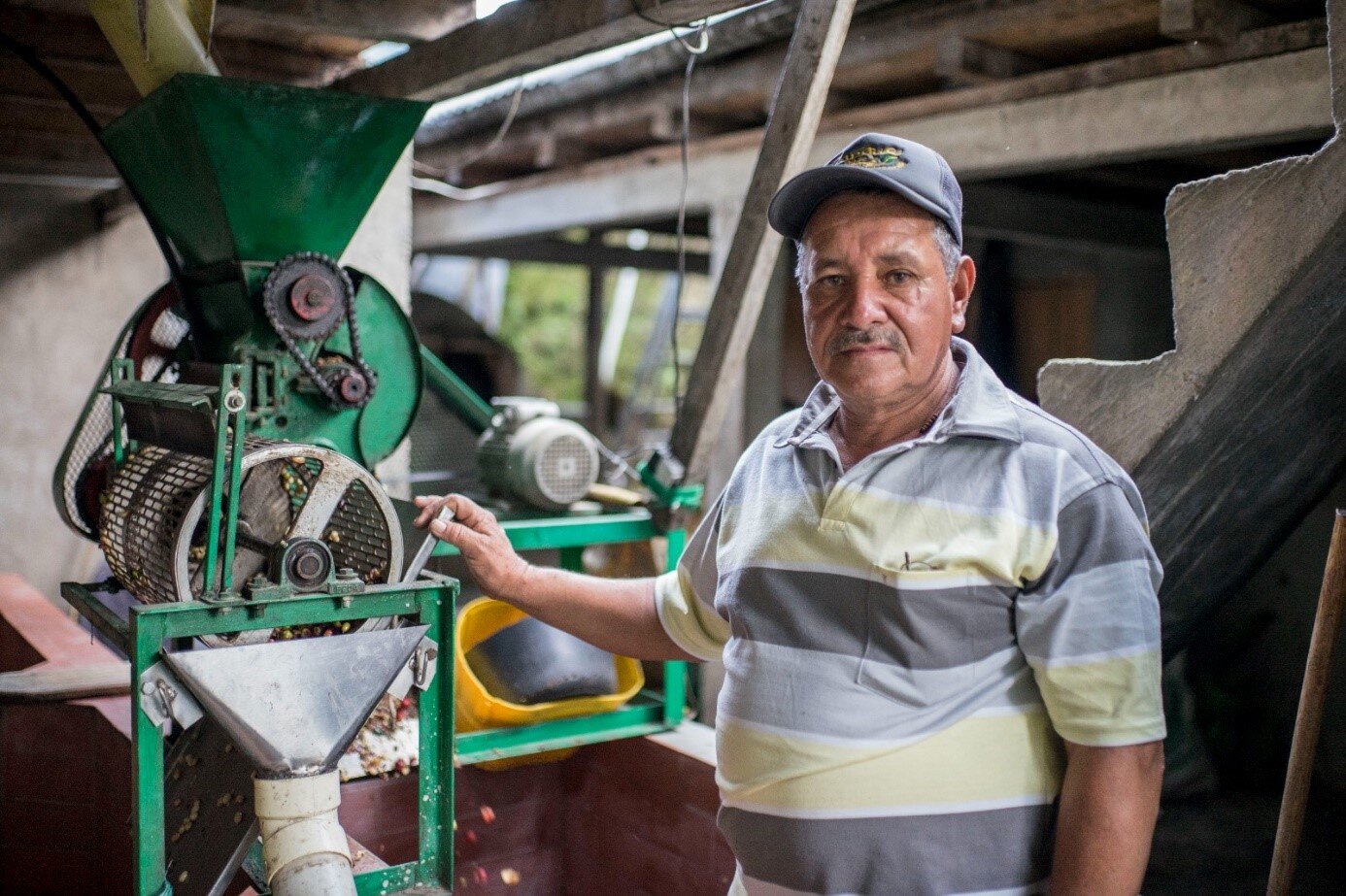
Lena, Country Program Manager for Colombia in the Tchibo Corporate Responsibility Team:
"During my trip to Colombia, I met many coffee farmers, and once again, it was confirmed: There is no such thing as just one coffee farmer. The spectrum is enormous! What I want to emphasize here is that all these people, all these (coffee) farmers, have very different stories, backgrounds, challenges, needs, and desires. It's not enough to set a standard and thereby establish sustainability in the supply chain. Support must address individual challenges so that we can create a long-term impact. This is precisely what we want to achieve in Colombia, but of course also in our other countries of origin!"
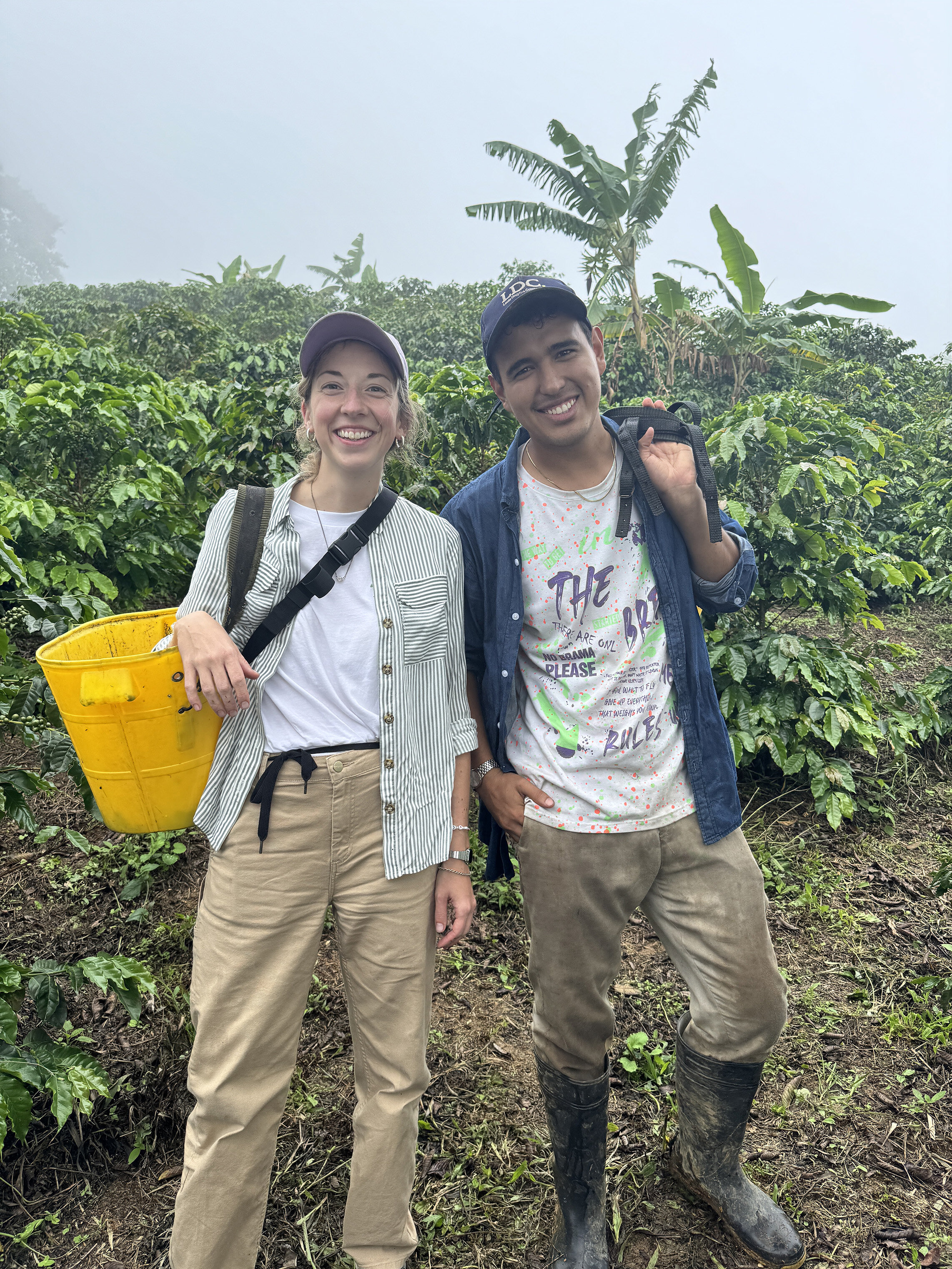
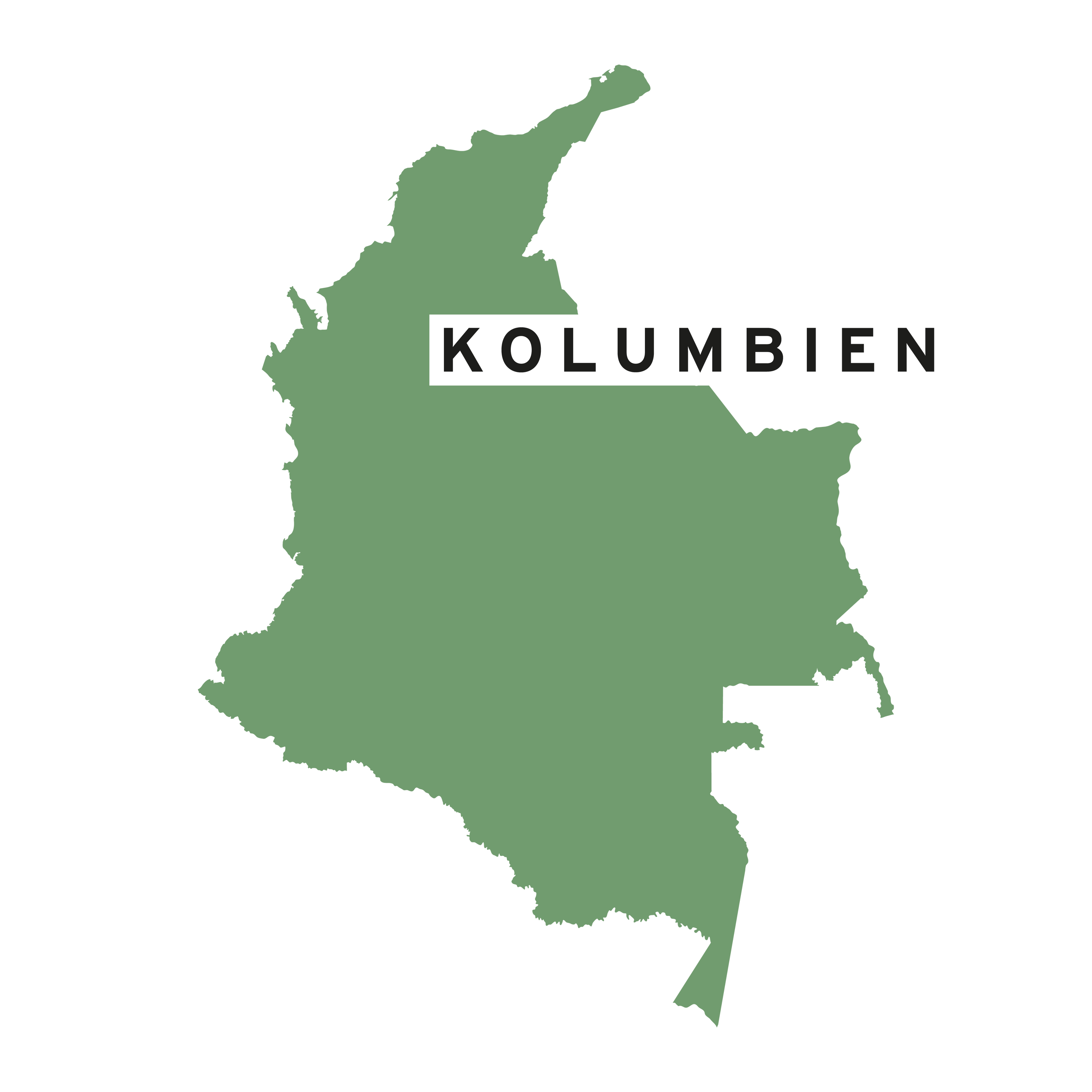
Peru
Project: Junín | 2025-2030
Project objectives: Adaptation to climate change through the promotion of renewable farming practices, income growth through improved productivity and quality
Identified challenges: Poverty, emigration, soil erosion, water pollution, climate change
Together with our partner Perhusa, we are striving to improve the sustainability and efficiency of coffee production in the Junín region. These measures are intended not only to increase quality and productivity, but also to have a positive social and environmental impact. Through a comprehensive training programme, 1,800 coffee farmers are being trained in regenerative farming methods on practical demonstration farms.
Social aspects are also part of this project. Topics such as gender equality and the prohibition of child labour are addressed in the training courses. In addition, there will be workshops at schools to show young people the opportunities available in the local coffee industry. In this way, we want to counteract the outflow of people from rural areas.
Perhusa
The project activities were launched in October 2025. By the end of the year, we had already reached 440 farmers and inspired them to join our project. The aim of the first training sessions was to teach farmers how to prepare new seedlings so that they are as healthy as possible and grow efficiently.
Corali, coffee farmer:
"Continuing coffee cultivation is currently a major challenge. Pests and diseases are causing significant losses, and changing rainfall patterns are declining yields. Many people are abandoning coffee and cultivating other crops, such as cocoa. But we want to keep fighting because we love the product."
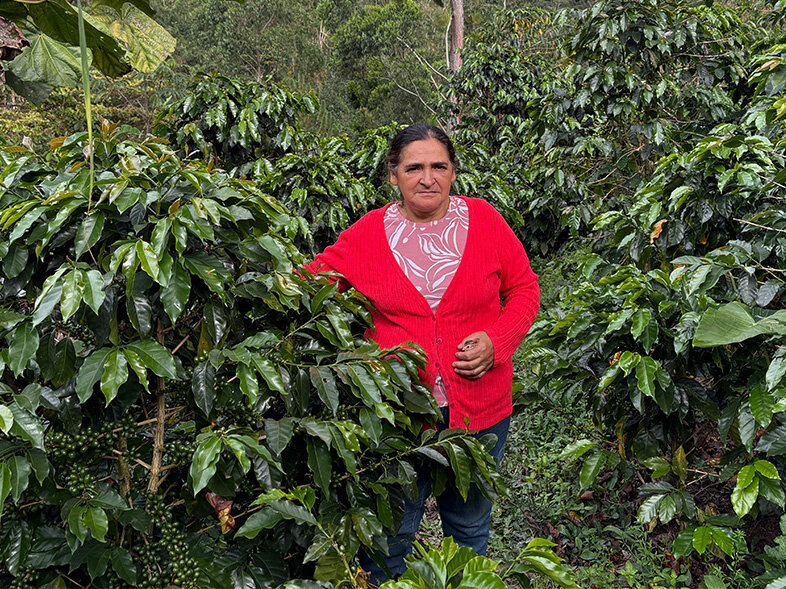
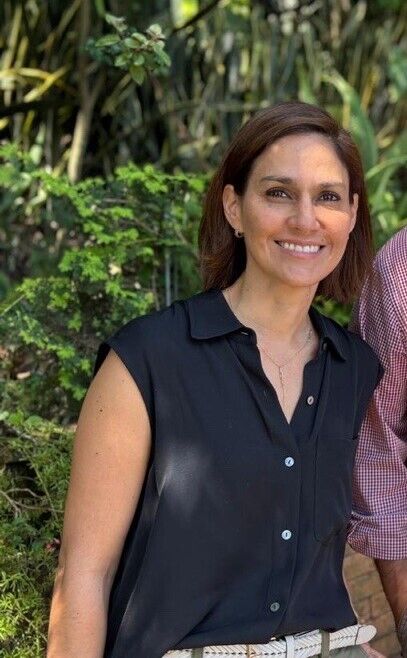
Crista Foncea, serves - in addition to her role as Director of Coffee Care - as Tchibo's representative in Guatemala, Peru, and Honduras, coordinating regional sustainability programs as the central liaison between coffee farmers, partners, and Hamburg headquarters.. She explains:
"Building on my roots in the Guatemalan coffee sector and my experiences in Honduras, it is a privilege to co-manage this project in Peru and witness how our shared challenges transcend borders. I am deeply optimistic about our progress here, as we are building on years of collective lessons and refined strategies to better support our farming communities. My goal is to ensure that every past experience translates into meaningful, sustainable growth for the producers we serve today."
Dorian, Country Program Manager for Peru in the Tchibo Corporate Responsibility Team:
"The Tchibo coffee program focuses on equipping farmers with the knowledge to increase the productivity and quality of their coffee plants. This empowers them to increase their income and improve their living conditions."
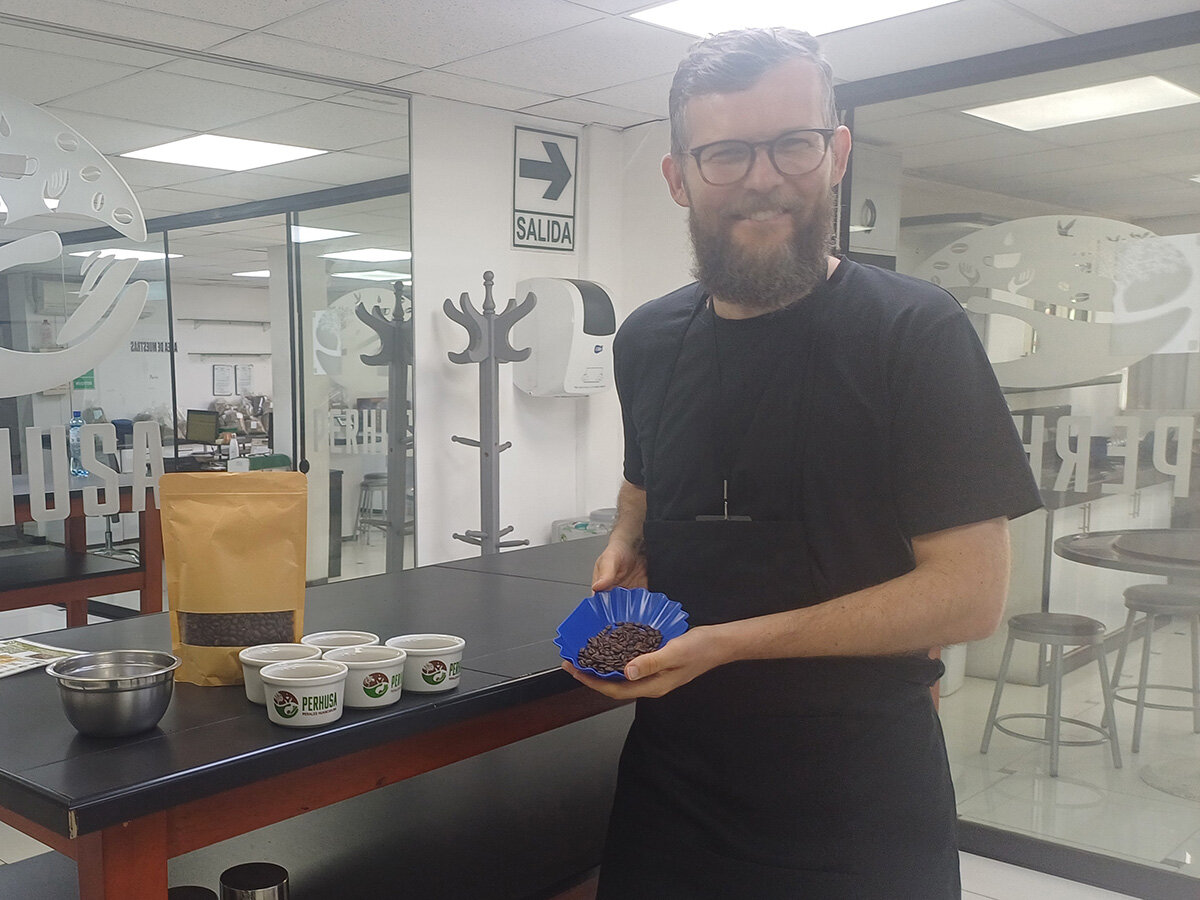
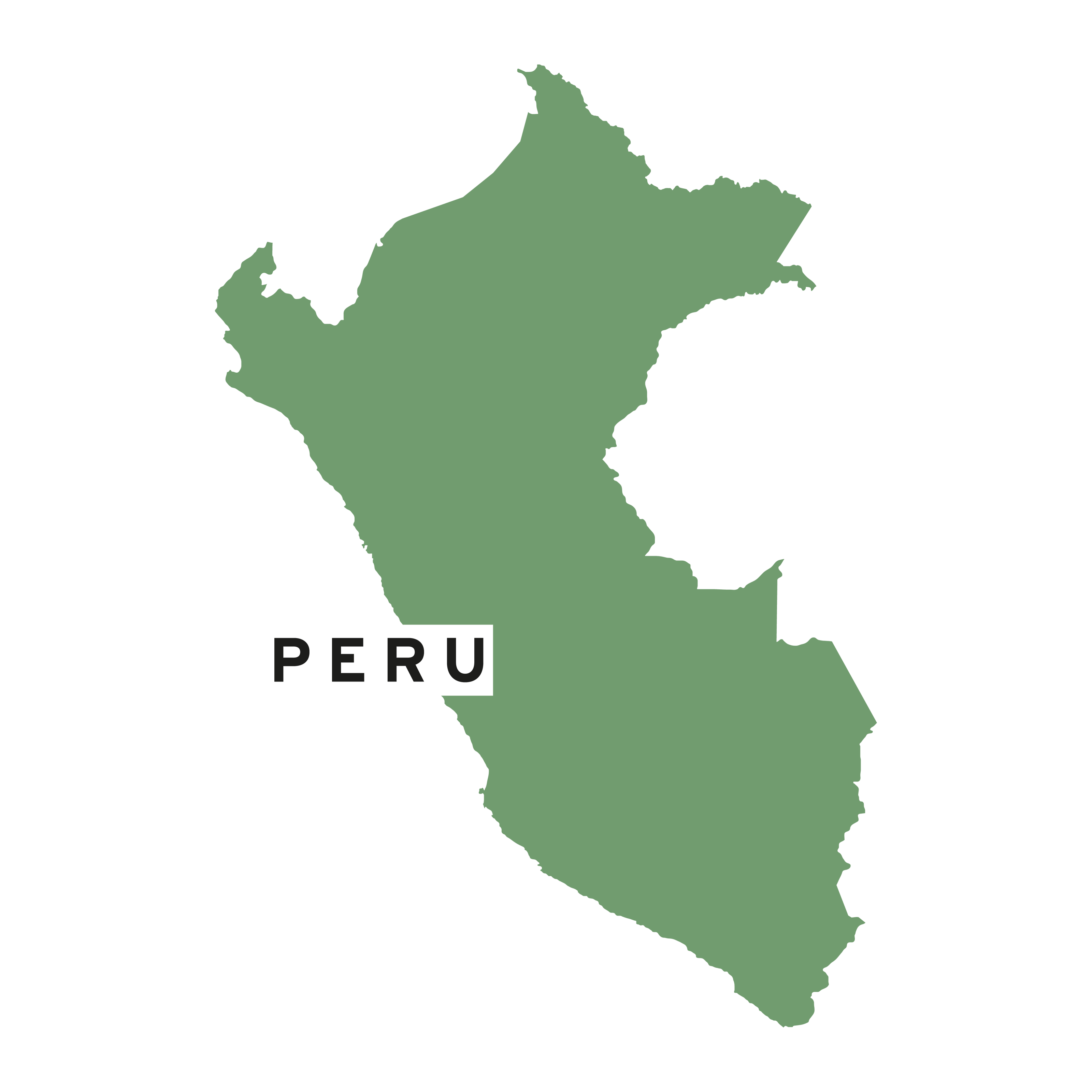
Tanzania
Project: Mbyea und Mbozi | 2017-2026
Project objectives: Empowering the next generation of coffee farmers, increasing productivity and quality through enriching knowledge, expertise, and dissemination of knowledge on sustainable coffee cultivation.
Identified challenges: Gender inclusion, climate change
Promoting young talent & imparting knowledge: To strengthen the knowledge of young farmers, Tchibo, in collaboration with City Coffee, has launched Coffee Clubs. These are school-based workshops that take place at seven schools in Mbyea and Mbozi. They cover everything from cultivation to the successful sale of coffee. Various modules cover the recognition of plant diseases, fertilizer skills, and the appropriate use of water. In addition, in-depth information on correct pruning and high-yield harvesting methods is shared. The workshops are designed not only to provide ecological information on the cultivation and maintenance of coffee plants but also to equip participants with the skills they need to run a successful farm. With this in mind, important aspects such as occupational health and safety and management skills are also addressed. The workshops often lead to increases in productivity and quality – an important motivational factor for the students. As part of the project, the parents provide the young people with a portion of their farm, where they can initially apply their knowledge – ideally, they can take it over in the future and thus ensure the availability of coffee in Tanzania.
Fruit project: Between October 2020 and September 2022, an additional project was launched within the framework of the Coffee Clubs. With City Coffee, we planted a total of over 30,000 coffee plants and over 8,400 fruit trees during this period – from avocados and bananas to mangos and papayas. Almost 5,000 of the fruit trees were planted at the seven schools, while the rest were taken home by 347 Coffee Club participants. This not only improves the nutritional situation in the schools and at home, but also provides the farming families with an additional source of income through potential sales. Field diversification also has a positive impact on soil health.
City Coffee
Coffee Clubs were established in a total of seven Tanzanian schools, with a total of 908 students participating. Of these, 240 are graduates, and the remaining 668 are current students. The positive impact of the Coffee Clubs is evident even after graduation – 65% of the graduates continue to work in coffee farming. The schools have provided land for the Coffee Clubs so that students can gain experience there and then apply the knowledge they have learned at home. Win-win: This allows the school to generate additional income, which in turn benefits the schools and students. The Coffee Clubs have great potential: The students learn how to properly handle the plants and fertilizers and bring their knowledge home, where their parents, in turn, learn from their children. Thus, the whole family benefits indirectly. The Coffee Club concept is generating interest, and we are in regular contact with local institutions and organizations on the topic.
What we learned from this program: Incorporating women into the project is a challenge. 45% of the graduates are women and 55% are men. In the future, we want to improve gender inclusion and place an even stronger focus on integrating and involving all genders. The Coffee Club trainers will also be trained for this purpose. Experience has shown that Coffee Clubs work best at schools where the school management is behind the idea and fully supports it. In personal and professional partnerships, misunderstandings and a different understanding of the situation can arise. We originally planned to use the fruit trees as shade trees for the coffee plants and to promote soil diversification. Some of the fruit trees were planted in open fields because this was quicker to implement. We learned from this to communicate even more clearly with each other and to be more precise in our respective statements.
Martha Kimboi , teacher and coordinator of the Coffee Clubs:
„I am incredibly proud to be able to train and support the next generation of coffee farmers!“
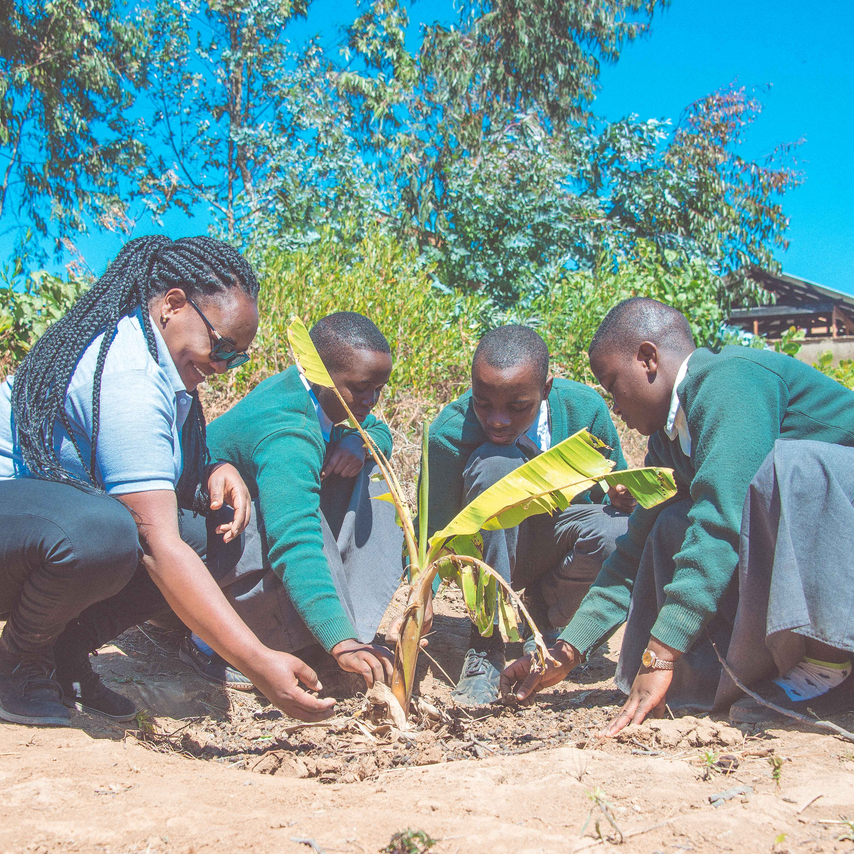
Aida, Country Program Manager for Tanzania in the Tchibo Corporate Responsibility Team:
"What's special about this project is that young people learn how to cultivate coffee using the latest methods and take what they've learned home with them to their own farms. We've also introduced an internship program in which a small group of participants learns how to detect defects in coffee cherries and sell the green coffee at auctions. This provides a more holistic picture and demonstrates the value of coffee and their work in the field."

In 2025, we launched our school coffee "Kahawa Skuli" for the third time: the very limited specialty coffee from our coffee program in Tanzania.
Kahawa Skuli was cultivated by young farmers who, as part of our coffee program, learn how to cultivate coffee more sustainably in school clubs. The topics range from cultivation, such as water and soil conservation and the use of natural fertilizers, to harvesting methods and the successful sale of coffee.
About the product:
- Specialty coffee with fruity notes of blackberry and dark chocolate
- 100% Tchibo Arabica coffee beans from Tanzania
- Ideal as a filter coffee from a hand-held filter or as a caffè crema from a fully automatic coffee machine
- Limited Edition: Available for a short time only
- Intensity: 4/6
Acidity: 4/6
Body: 3/6
Roast: 3/6
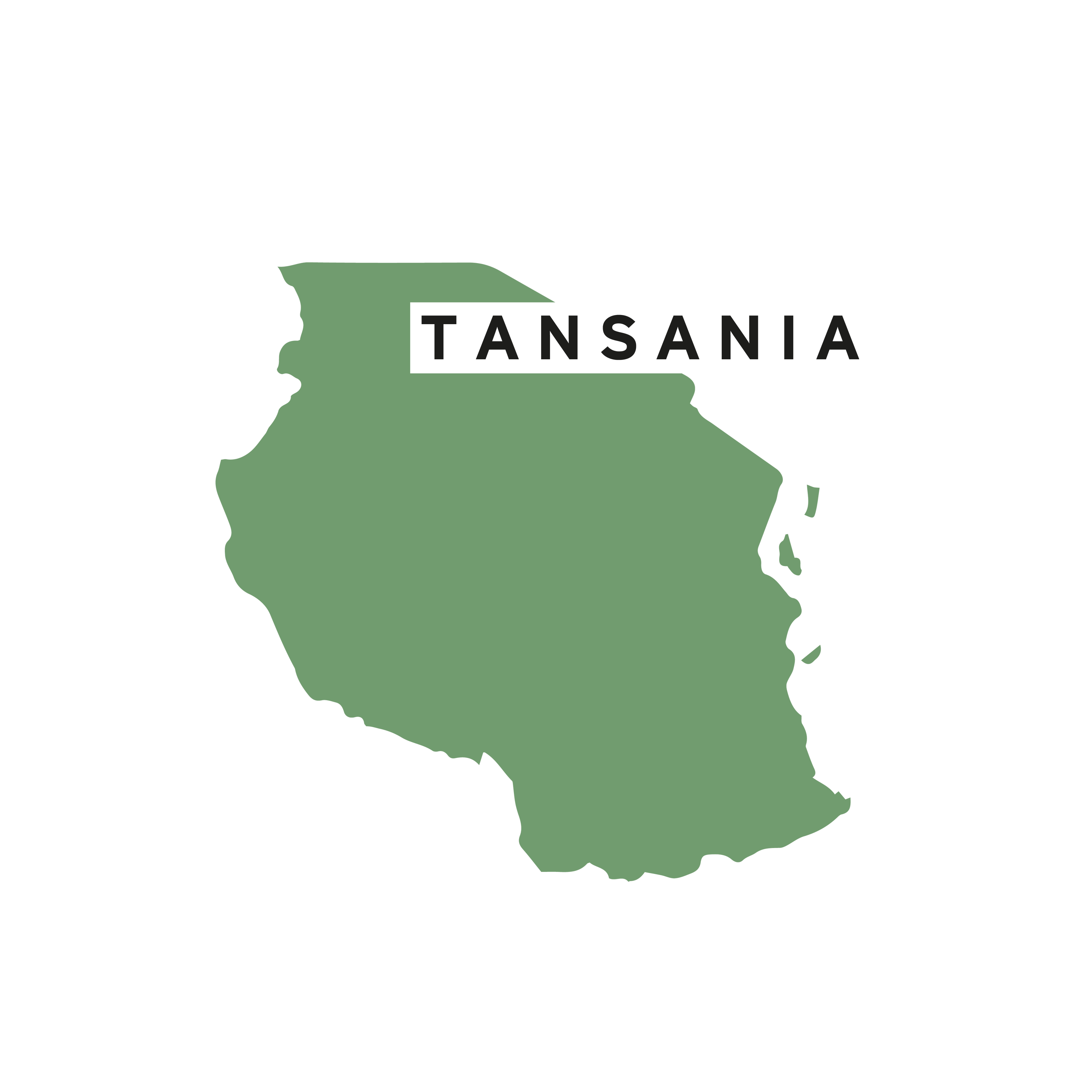
Vietnam
Project: Central Highlands | Climate-resilient coffee cultivation | 2022-2028
Project objectives: Income increase, environmental protection, climate change mitigation
Identified challenges: Poverty, overuse of agrochemicals, drought and water scarcity, impacts of climate change
Skills workshops for farmers: Against poverty, for climate protection: In collaboration with the Neumann Kaffee Gruppe (NKG) and SNV Netherlands Development Organisation, Tchibo is establishing projects in Vietnam to build skills for local smallholder farmers. A total of 12,000 coffee farms in Vietnam will benefit from the workshops over the entire project period. The overarching goals of the joint project are to contribute to increasing income, promoting the conscious and responsible use of agrochemicals, reducing harmful emissions, and minimizing the local water footprint. In workshops on topics such as Good Agriculture Practices (GAP), occupational health and safety, the use of toxic agrochemicals and possible alternatives, knowledge of fertilizers, good farming, cost management, and accounting, the farmers learn how to make coffee cultivation as ecological and profitable as possible.
Theory meets practice: The workshops are designed to impart knowledge through both theoretical teaching materials and practical modules. A total of 60 model farms are available to demonstrate optimal conditions for coffee cultivation. Interaction and learning with and from each other also play an important role. Farmers are deliberately involved in the workshops. This way, their experiences and feedback are incorporated into the collaboration, and a relationship of trust develops between participants and trainers. The workshops are designed for the whole family and take place at times of day when as many people as possible can benefit, especially women and young people.
Biochar production for better soils: In a feasibility study in collaboration with the consulting firm dss+, Tchibo is testing the benefits of pyrolysis ovens on coffee farms. Since January 2022, the machines have been deployed on 20 test farms. Using the ovens, farmers can produce their own biochar from organic waste, such as coffee husks and tree pruning residues. This can then be mixed into the soil as a carrier for fertilizer or compost and contributes significantly to soil improvement. The results from the biochar production tests and the field trials conducted at WASI will form the basis for future perspectives on biochar implementation, not only to reduce greenhouse gas emissions from coffee, but also to increase the resilience of the supply chain to climate change and enhance the benefits for farmers.
Transition from monoculture to polyculture: We promote the cultivation of different trees (regional shade trees and fruit trees) on the same area. Polyculture in coffee cultivation offers numerous advantages over monoculture. These include improved soil fertility, increased biodiversity, better pest control, adaptability to climate change, and additional income if the fruit is sold.
Understanding the water requirements of Robusta coffee: Vietnam is the most important country for Robusta cultivation and most of it is irrigated with high water volumes. Reduction of irrigation is highly relevant to mitigate the negative impacts of climate change and prevent habitat degradation, groundwater depletion and desertification. Together with the Agricultural Research Centre for International Development (CIRAD) and Western Highlands Agriculture and Forestry Science Institute (WASI) Tchibo is supporting a coffee irrigation study in Vietnam. The main goal of this trial is to reduce the irrigation volume for Robusta without affecting yield nor quality, through understanding the crop requirements, estimating the impact of crop diversity on water use efficiency and modelling the impact of climate change. The four-year trial is equipped with sap flow sensors to measure the real-time transpiration of coffee trees (equivalent to water consumption by coffee trees). During harvesting season, coffee yield and quality will be measured at harvest and compared to water consumption. This will inform on the performances of coffee trees under different irrigation schemes. The results will be transferred into sustainable schedules & volumes for irrigation, trainings materials for farmers will be developed based on the findings – presumably already in 2025.
Neumann Kaffee Gruppe (NKG) bzw. Neumann Gruppe Vietnam Limited, Sustainable Solution Switzerland (DSS), SNV Netherlands Development Organisation
In the first two years of the project, we were able to recruit 4,000 of the targeted 12,000 farms for our program. The recruitment process is made more challenging by the fragmented nature of coffee farming and limited infrastructure in remote growing areas. We are also observing a certain degree of project fatigue among farmers who are contacted by multiple organizations simultaneously. Nevertheless, we are recording considerable success: participating farmers have attended an average of three workshops, demonstrating their continued commitment. A particular milestone is the establishment of 14 model farms as practical learning centers, where farm families can learn from each other and with each other in close proximity. The individual Farmer Coaching Visits have proven extremely effective – they not only allow for the practical consolidation of what has been learned, but also create valuable opportunities for personal exchange. This direct contact has enabled us to build trusting relationships, which are crucial to the long-term success of our work. Based on valuable feedback from participants, NKG has continuously improved the workshops and made them more interactive, as we firmly believe that people learn best through hands-on interaction. Our approach, which empowers coffee farmers to contribute their own ideas and shape their own solution processes, is bearing fruit. The exchange of experiences through observation, discovery, and group discussions promotes the emergence of local expertise and supports farmers in becoming experts in their own fields.
H Ha Kpa, coffee farmer in Vietnam:
"Before I participated in the program with Tchibo, I was a very shy person, and my coffee-growing practices weren't yet up to date. However, after participating in the project and meeting many people and gaining new experiences in coffee farming, I noticed many changes in myself: I felt more confident, and my coffee-growing methods had improved."
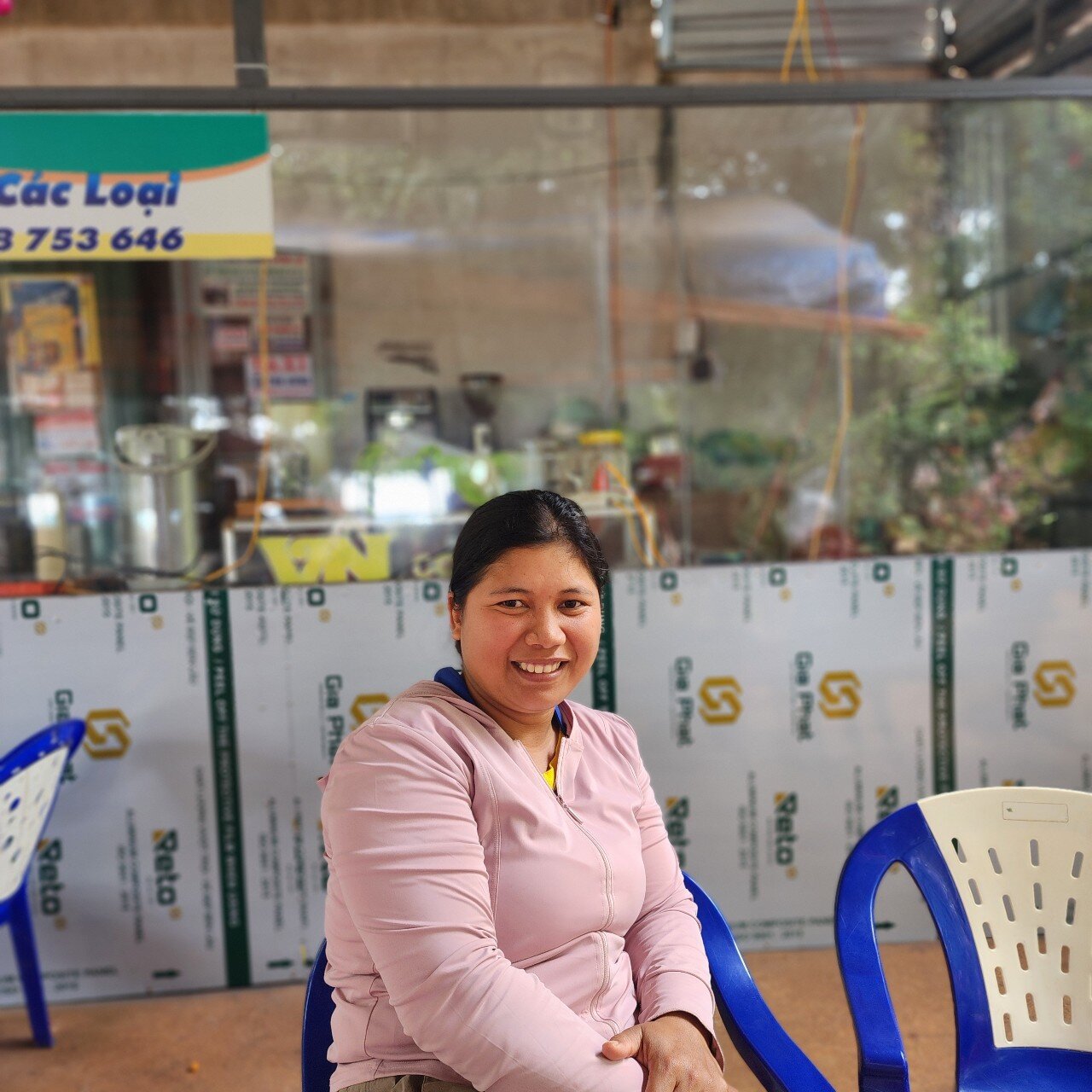
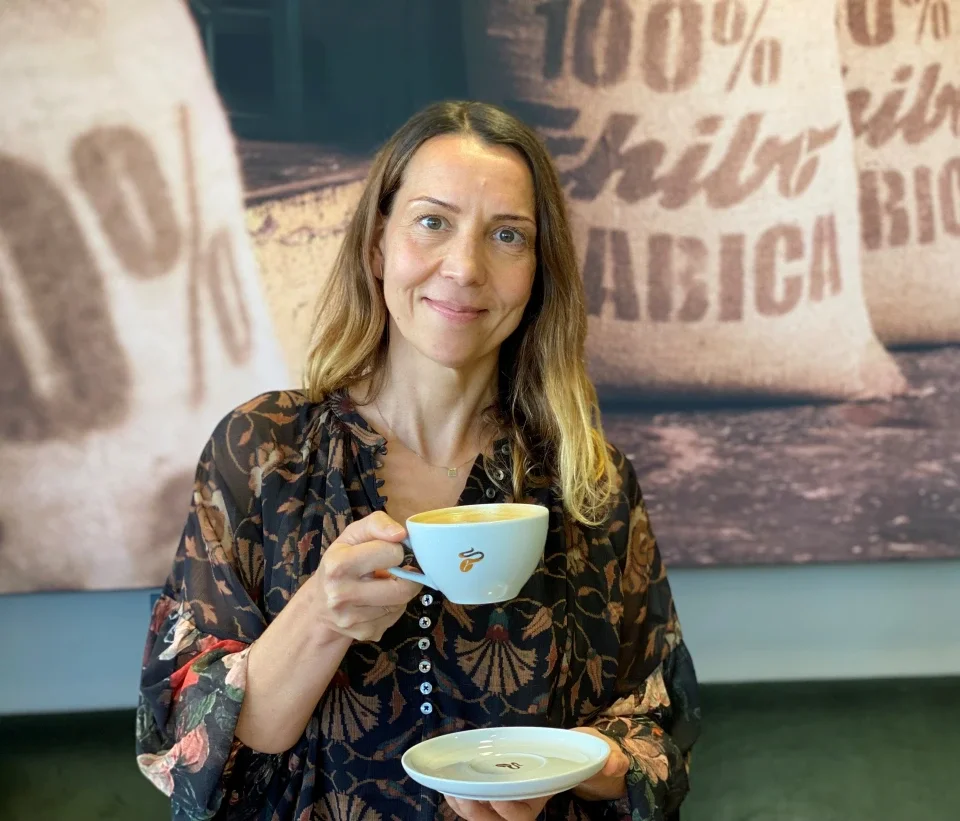
Fanny, Country Program Manager for this project in Vietnam in the Tchibo Corporate Responsibility Team:
"The program's implementation is a mix of theory and practice. On the planned 60 model farms, we will learn from each other in the future, and the needs of the farmers and their families will be the focus of our work. The goal is to develop programs that enable the farming families to work on an equal footing with us and our partners. We also aim to create shared values with the people, engage in dialogue with them, and listen to their needs. We simply test possible solutions together."
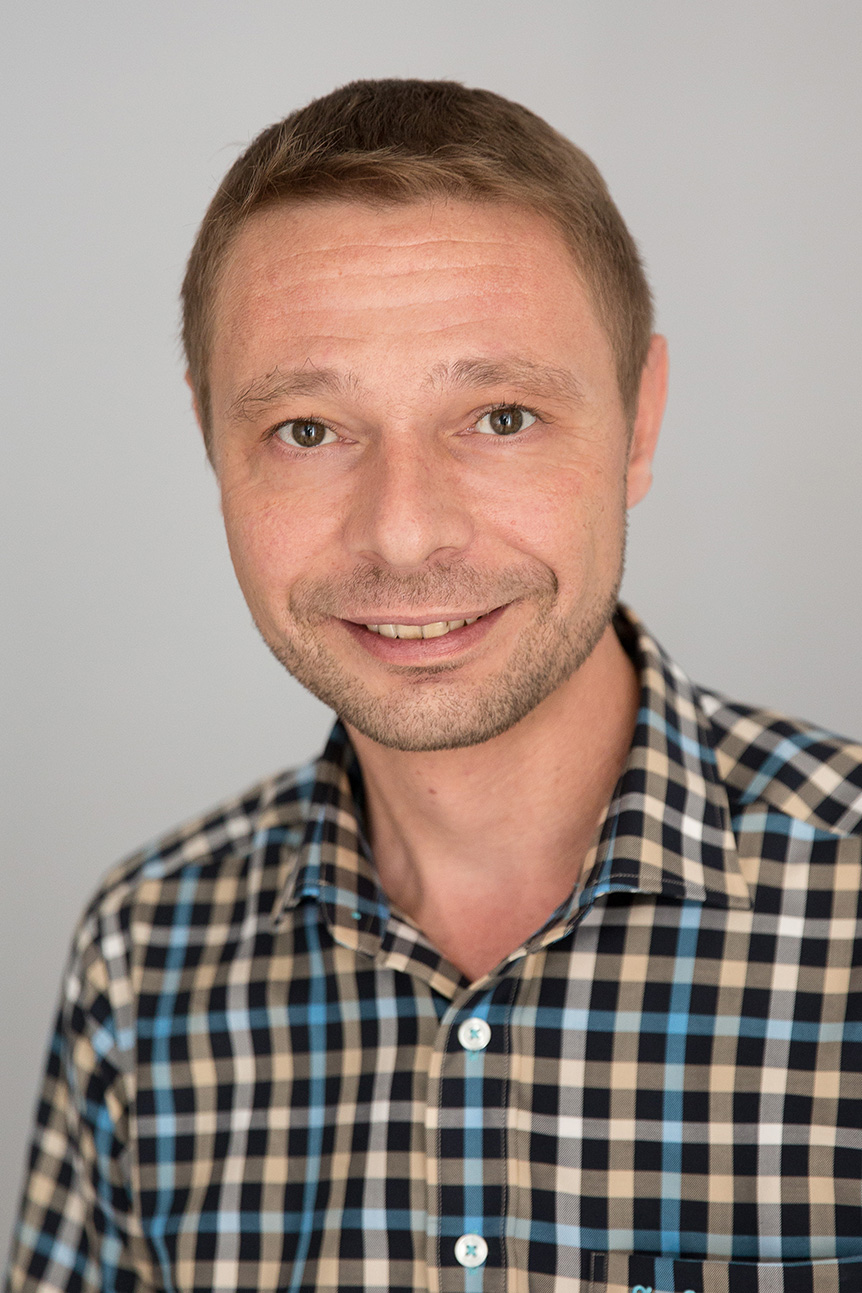
Dave is Tchibo representative in Vietnam. He explains:
"The Vietnamese program targets the poorest coffee farming families with a demand-driven and impact-oriented approach, a revolutionary change compared to traditional supply chain projects. I am proud that Tchibo co-invested in a new irrigation study for Robusta coffee in cooperation with CIRAD. It confirms my own hypothesis that we can further reduce irrigation volumes by 40% compared to my doctoral research findings back in 2004."
Project: Central Highlands | EUDR Readiness | 2024-2026
Project objectives: environmental protection, traceability, compliance
Despite its important goal of protecting forests, the European Deforestation Regulation (EUDR) puts considerable pressure on (especially) smallholder coffee producers. With the upcoming legislation, millions of smallholder producers will have to geographically locate their farms to meet the requirements and gain access to the European market. Compliance with the regulations and providing the necessary documentation can be a significant challenge, especially for the most vulnerable smallholder farmers. Although Vietnam is the largest producer of Robusta coffee, most Vietnamese producers are smallholders, 95% of whom cultivate less than 4 hectares of land.
Tchibo and Olam Vietnam are supporting these coffee producers in complying with the regulation. As part of the project, we are conducting workshops on sustainable farming methods, including EUDR requirements, collecting geospatial data, and conducting risk assessments. High-risk hotspots are being identified for further investigation and evidence for risk mitigation. For example, we are engaging with local authorities to confirm land rights if producers cannot provide the relevant documentation.
Olam Vietnam
EUDR Readiness: One of our successes is that we have already integrated more than 800 farmers into our supply chain. We conducted workshops with them, mapped, and verified farms. One of our very concrete lessons is that the risk of deforestation, or rather the actual deforestation after the deadline, is significantly lower than we originally assumed. The greater challenge in the context of the EUDR is that not all farmers have land titles for the land they cultivate. Our project partner is therefore working closely with the local authorities to provide the relevant proof of legality and thus secure market access for the farmers.
Lena, Country Program Manager for this project in Vietnam in the Tchibo Corporate Responsibility Team:
„Despite its important objective, the European Deforestation Regulation (EUDR) puts significant pressure not only on international companies but also on smallholder farmers. With this project, we support farmers in Vietnam in complying with the EUDR through capacity building and data collection.“
